Renewable Energy Sources
Switching to Renewable Heat Pumps: A 6-Month Guide

Are you ready to upgrade your home’s heating system? Look no further, as our 6-month roadmap on transitioning to renewable heat pumps has got you covered.
We’ve got all the information you need to make an informed decision and embark on a journey towards a more sustainable future. From understanding the technology to finding qualified installers and securing financing, we’ve got you covered.
Get ready to experience the power of renewable energy and start saving on your energy bills today.
Key Takeaways
- Renewable heat pumps provide both heating and cooling for buildings, extracting heat from air, ground, or water sources through the use of a refrigerant.
- Conducting an energy audit checklist can help identify areas for improvement in insulation, size, layout, and the efficiency of the current heating system in your home.
- Assessing factors such as insulation, ductwork condition, available space, and government regulations is crucial to determine the compatibility of your home for a heat pump system.
- Understanding different types of heat pumps available, considering sizing and efficiency, and installation considerations are important in choosing the right heat pump system for optimal performance and energy savings.
Understanding Renewable Heat Pumps
Let’s dive into the basics of renewable heat pumps and how they work.
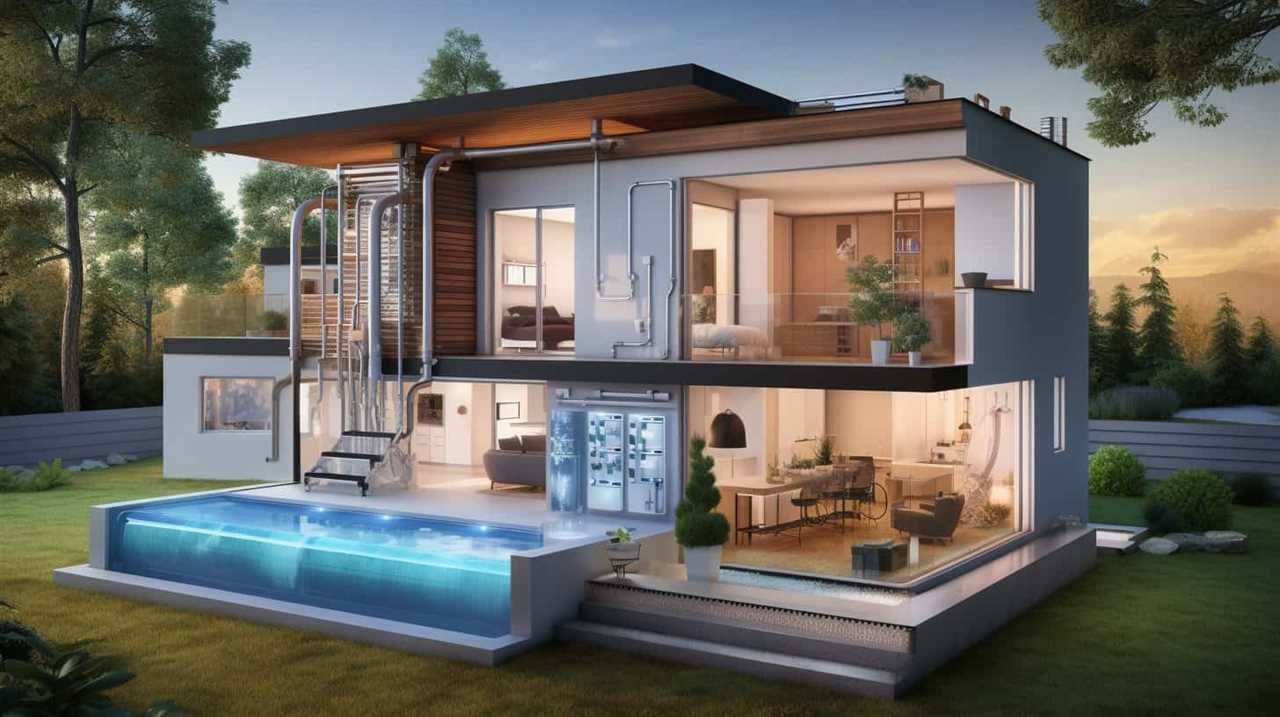
Understanding heat pump technology is essential when exploring renewable energy alternatives. Heat pumps are highly efficient devices that can provide both heating and cooling for residential and commercial buildings.
They work by extracting heat from the air, ground, or water sources, and then transferring it to heat or cool a space. This process is achieved through the use of a refrigerant, which absorbs and releases heat as it circulates through the system.
Assessing Your Home’s Energy Needs
Before making the switch to a renewable heat pump, it’s crucial to assess your home’s energy needs.
This can be done by conducting an energy audit checklist, which helps identify areas of improvement in terms of energy efficiency.
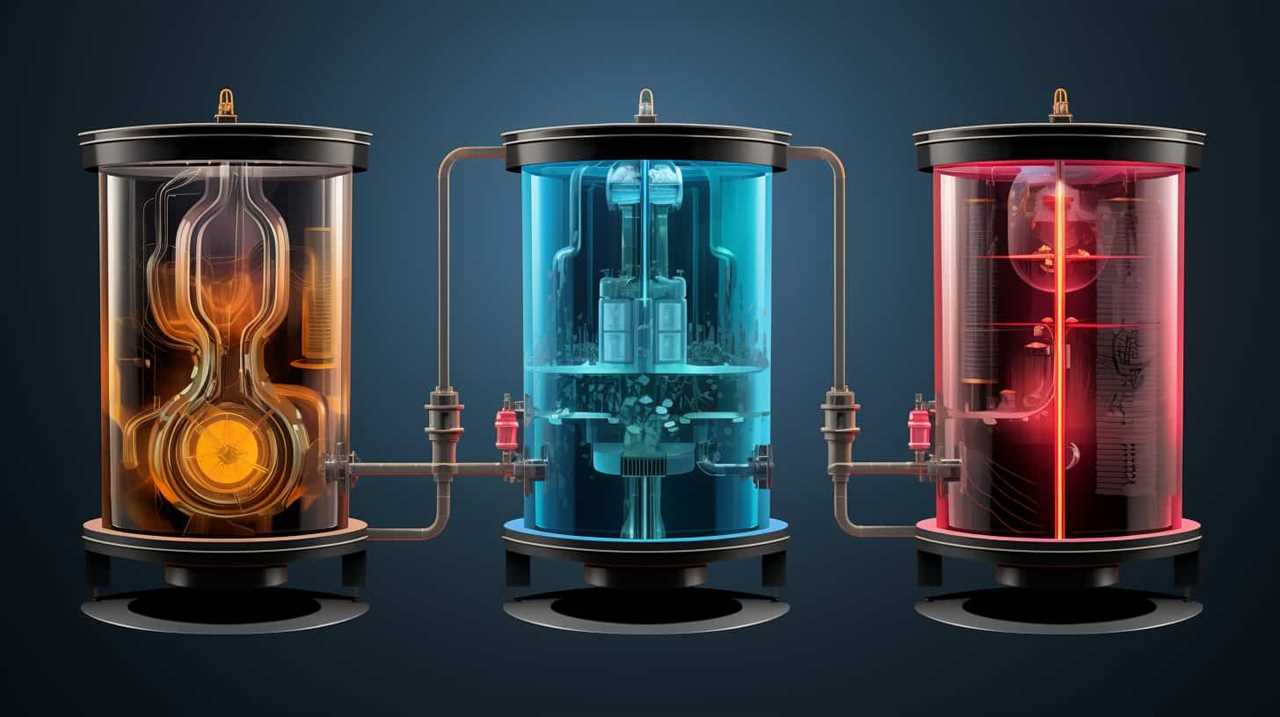
Additionally, it’s important to determine if your home is compatible with a heat pump system, considering factors such as insulation, size, and layout.
Energy Audit Checklist
What are the key factors to consider when assessing our home’s energy needs for a switch to renewable heat pumps?
Conducting an energy audit is an essential first step in the process. This audit involves evaluating your home’s energy usage and identifying areas where improvements can be made.
Some key factors to consider include insulation levels, air leakage, and the efficiency of your current heating system. Inspecting windows, doors, and the overall building envelope can help determine if there are any energy leaks.
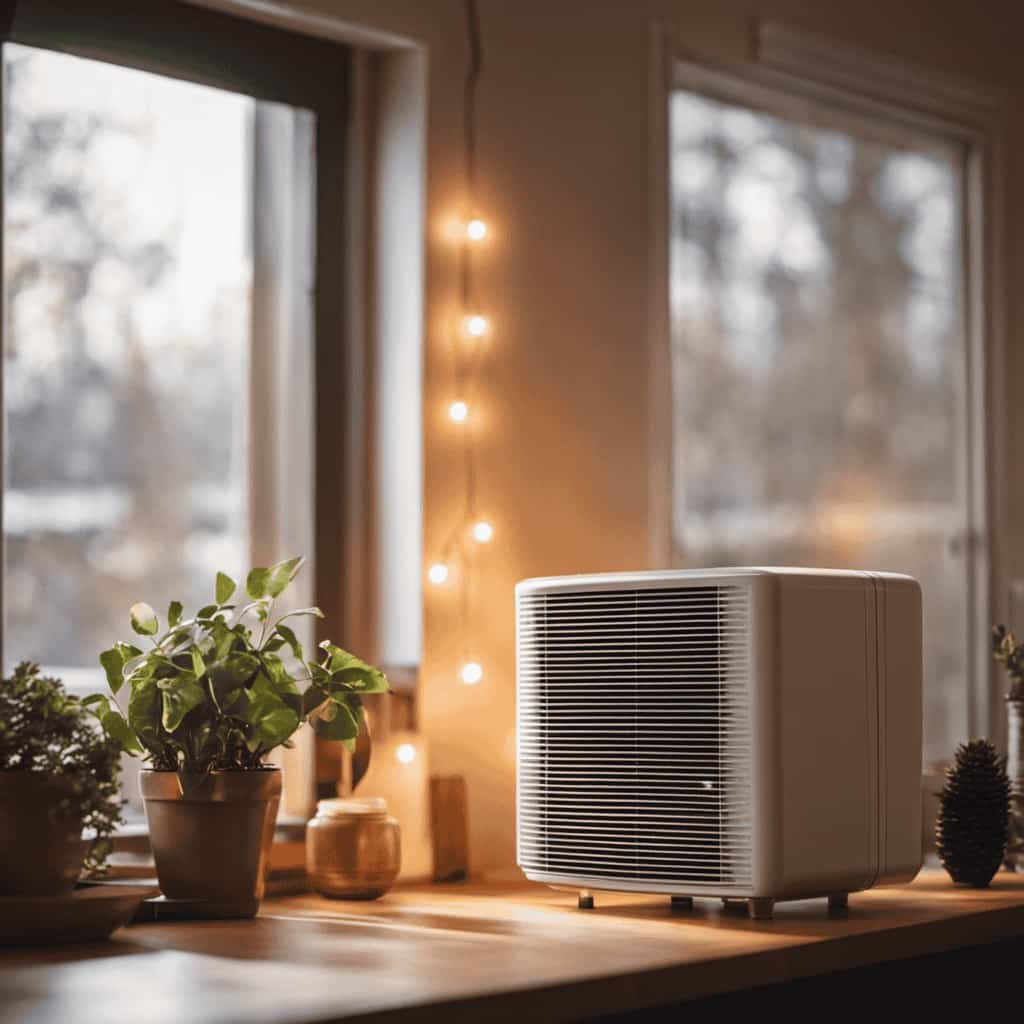
Additionally, analyzing your utility bills and conducting a thorough inspection of your HVAC system can provide valuable insights.
The energy audit process will help identify opportunities for energy efficiency improvements, which can significantly impact the performance and effectiveness of renewable heat pumps in your home.
Heat Pump Compatibility
We need to assess our home’s energy needs in order to determine if it’s compatible with a heat pump. Here are four key factors to consider when assessing heat pump compatibility:
-
Insulation: A well-insulated home will require less heating and cooling, making it more suitable for a heat pump. Conduct an energy audit to identify areas that may need additional insulation.
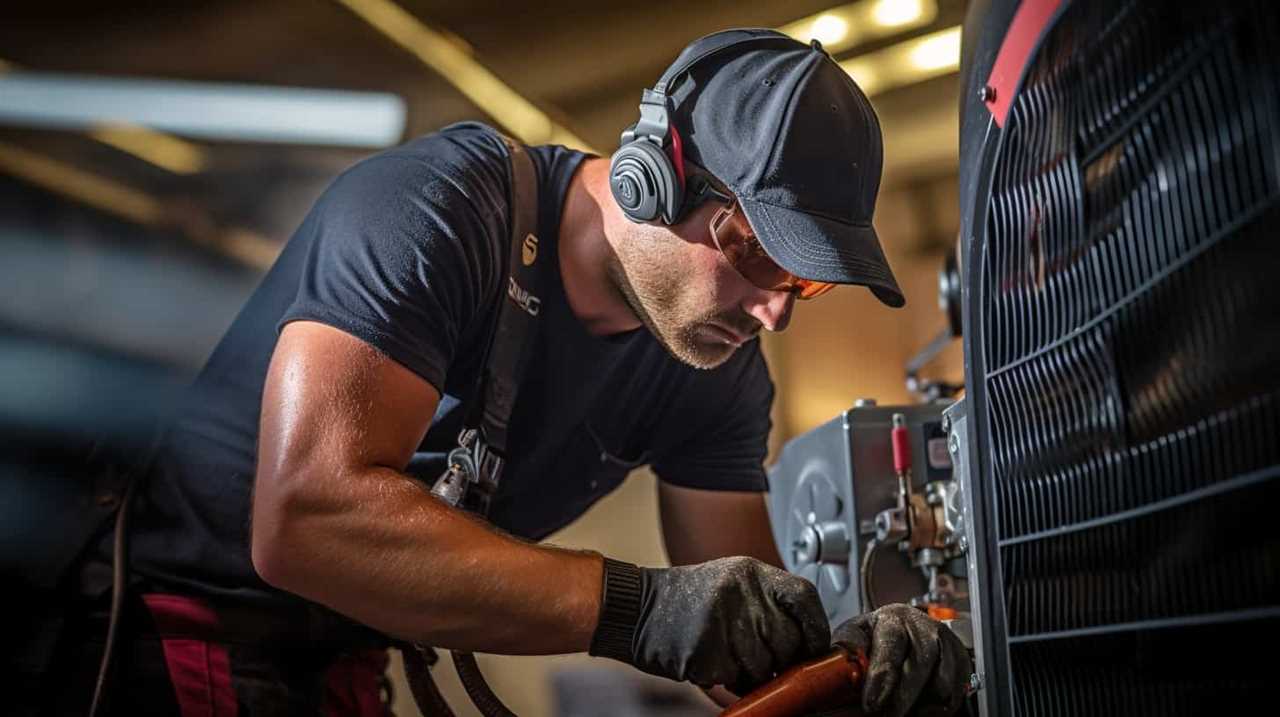
-
Heating and Cooling Load: Calculate the heating and cooling load of your home to determine if a heat pump can adequately meet your energy needs. Factors such as square footage, number of rooms, and climate conditions should be taken into account.
-
Ductwork: Assess the condition and design of your home’s ductwork. Heat pumps require proper ductwork to distribute heated or cooled air effectively.
-
Available Space: Heat pumps come in different sizes, so ensure you have enough space indoors and outdoors for the unit to be installed.
It is also important to research reputable heat pump brands and consider any government regulations or incentives that may apply to your region.
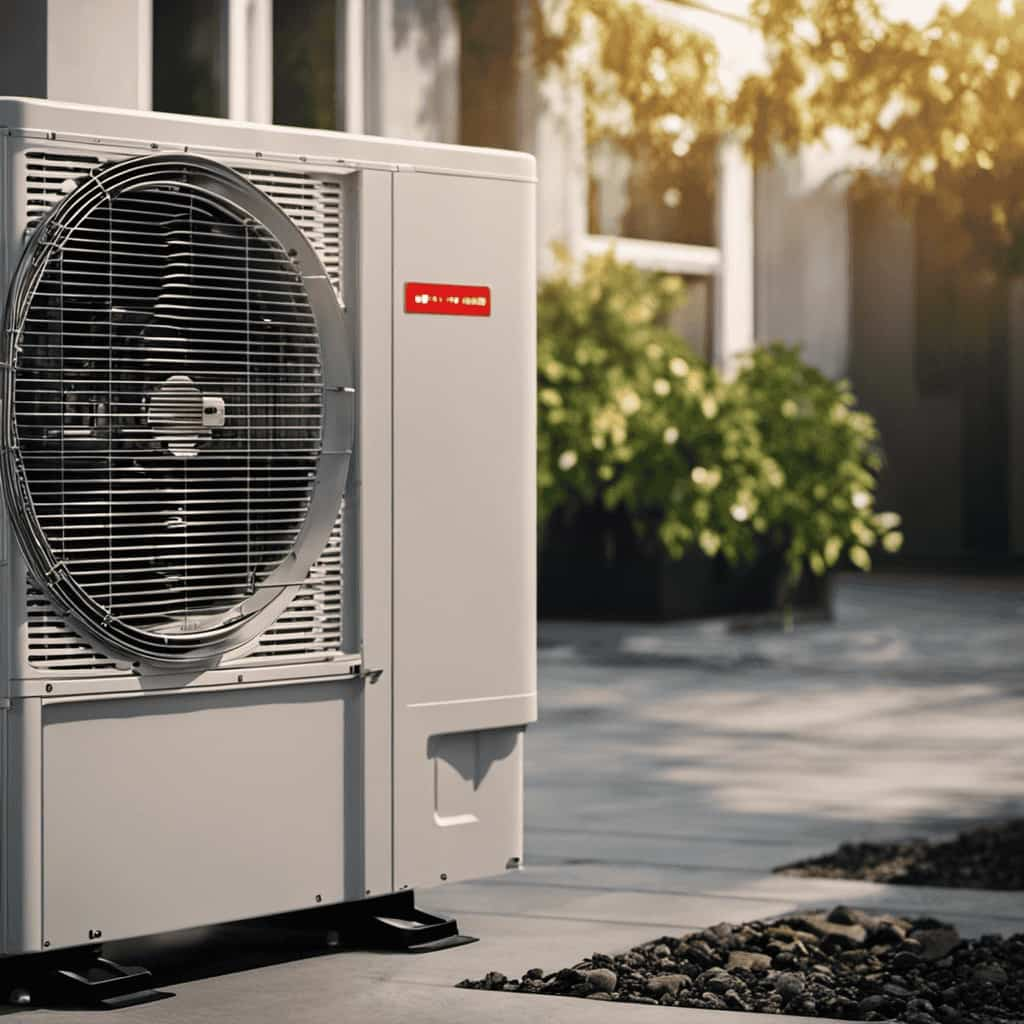
Choosing the Right Heat Pump System
When it comes to choosing the right heat pump system, there are several important points to consider.
First, you need to understand the different types of heat pumps available and determine which one is best suited for your home.
Additionally, sizing and efficiency play a crucial role in ensuring optimal performance and energy savings.
Finally, installation considerations such as available space and compatibility with your existing heating system shouldn’t be overlooked.

Heat Pump Types
Let’s explore the different types of heat pumps to help us choose the right system for our needs. When it comes to heat pump installation and maintenance, it’s crucial to understand the available options. Here are four types of heat pumps to consider:
-
Air-source heat pumps: These extract heat from the outdoor air and transfer it inside. They’re efficient in moderate climates but may struggle in extreme temperatures.
-
Ground-source heat pumps: Also known as geothermal heat pumps, these use the stable temperature of the ground to provide heating and cooling. They’re highly efficient but require a substantial initial investment.
-
Water-source heat pumps: These extract heat from a water source, such as a lake or pond. They offer flexibility in installation locations and are a good option if you have access to a water source.
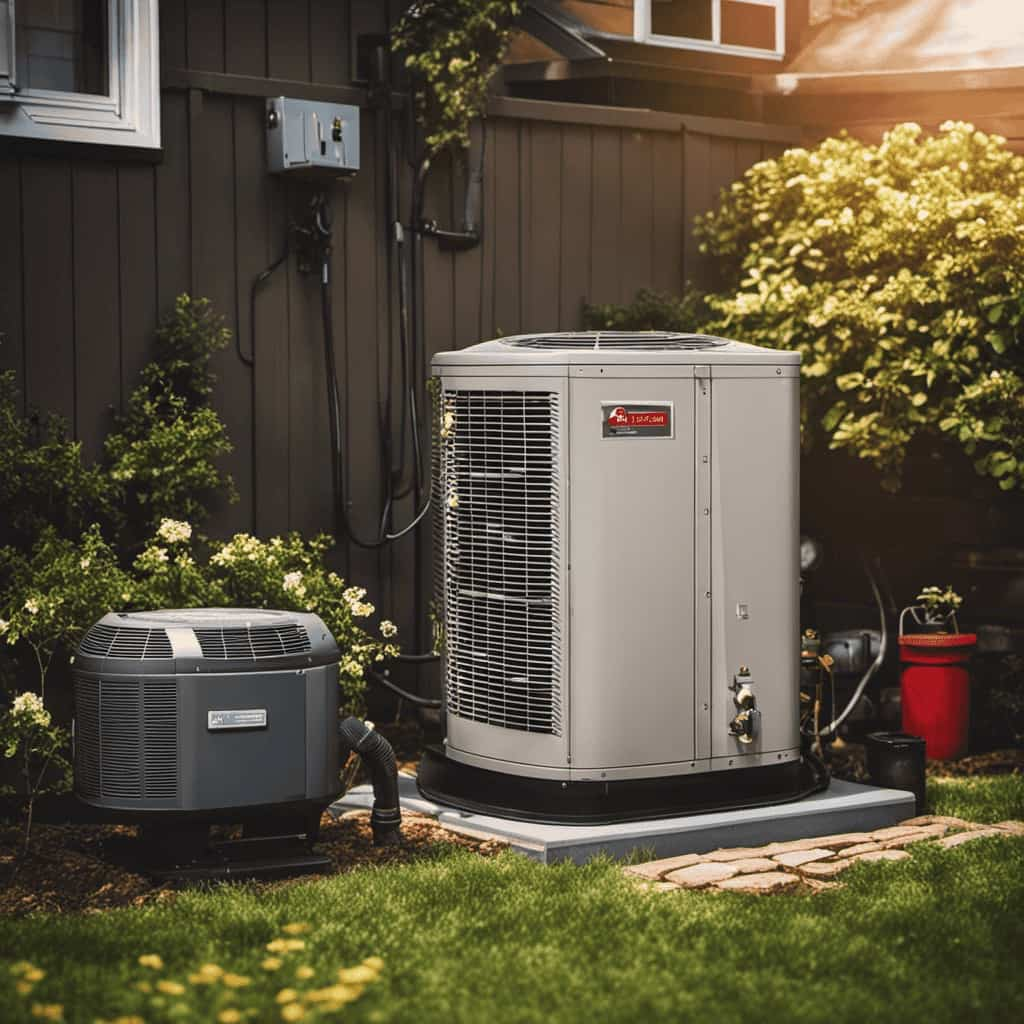
-
Hybrid heat pumps: These combine the benefits of both air-source and ground-source heat pumps. They can switch between the two depending on the outdoor temperature, maximizing efficiency.
Now that we understand the types of heat pumps available, let’s move on to the next step: sizing and efficiency.
Sizing and Efficiency
To ensure optimal performance and energy savings, it’s essential to select a properly sized and efficient heat pump system. Sizing calculation plays a crucial role in determining the right size for your home or building. It involves considering factors such as the climate, insulation levels, and the size and layout of the space to be heated or cooled. An undersized heat pump may struggle to meet the heating or cooling demands, leading to reduced efficiency and increased energy consumption. On the other hand, an oversized heat pump may cycle on and off frequently, resulting in unnecessary wear and tear and higher energy bills. Therefore, it’s important to consult with a professional to determine the appropriate size for your specific needs.
In addition to sizing, energy efficiency tips can further enhance the performance of your heat pump system. Firstly, ensure proper insulation and air sealing to minimize heat loss or gain. This will allow the heat pump to operate more efficiently by reducing the workload. Secondly, regular maintenance, such as cleaning or replacing air filters, can improve efficiency and prolong the lifespan of the system. Lastly, consider installing a programmable thermostat to optimize temperature control and reduce energy consumption when you’re away or asleep.
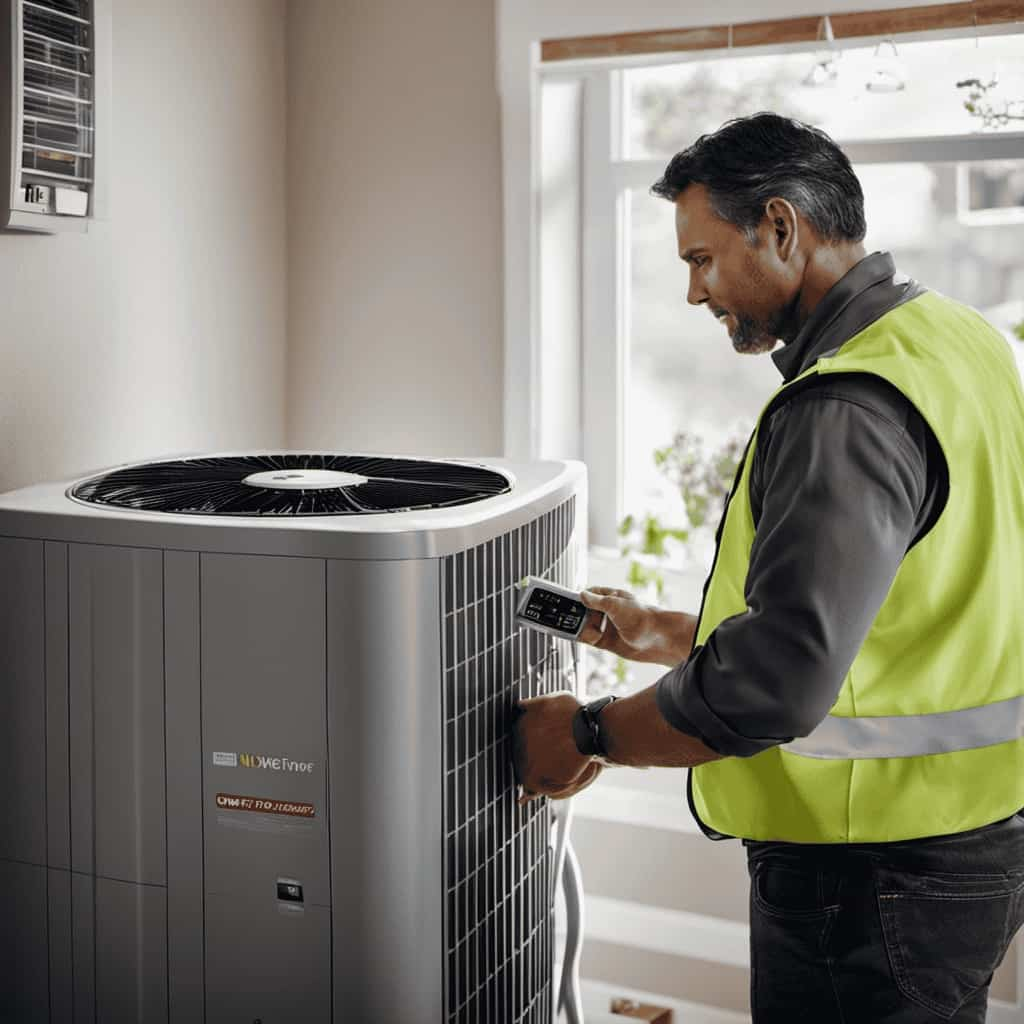
Installation Considerations
We recommend evaluating multiple options and selecting the most suitable heat pump system for our needs.
When it comes to installation considerations, there are a few key factors to keep in mind. Here are four important points to consider:
-
Installation requirements: It’s crucial to understand the specific requirements for installing a heat pump system in our property. This includes considerations such as available space, electrical requirements, and compatibility with existing heating infrastructure.
-
Environmental impact: As we strive for sustainability, it’s important to choose a heat pump system that has a minimal environmental impact. Look for systems that use eco-friendly refrigerants and have high energy efficiency ratings.
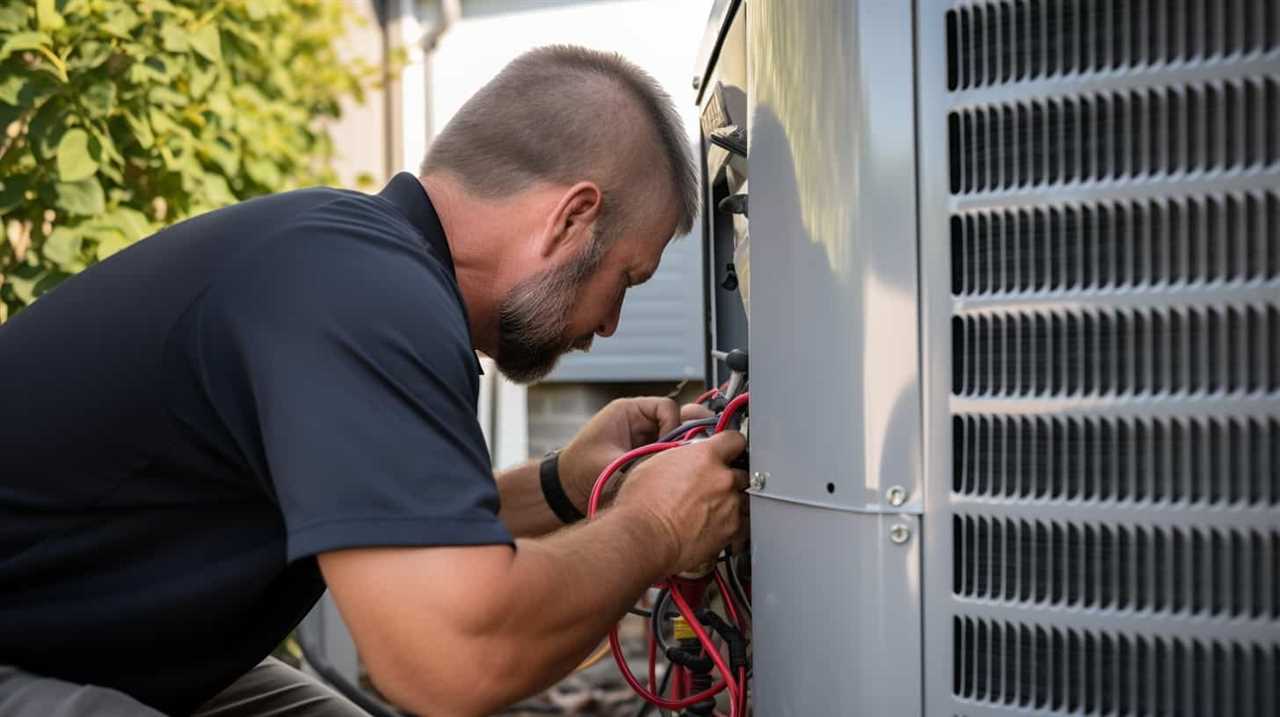
-
Expert installation: Proper installation is essential for optimal performance and longevity of the heat pump system. It’s advisable to hire professionals who’ve experience in installing heat pumps to ensure a smooth and efficient installation process.
-
Maintenance and servicing: Consider the maintenance requirements of the chosen heat pump system. Regular servicing and maintenance will ensure its longevity and efficient operation.
Finding Qualified Installers
We should begin by researching for qualified installers in our area.
When it comes to switching to renewable heat pumps, finding the right installer is crucial for a successful installation.
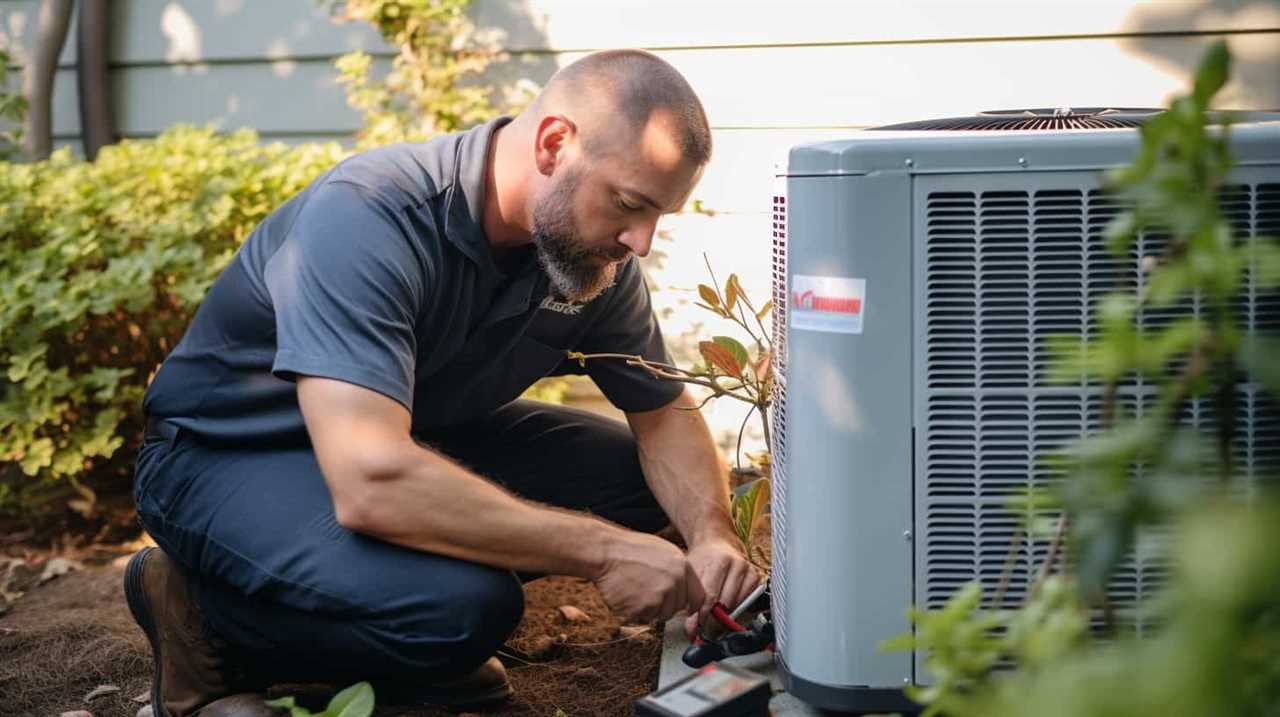
To find affordable options, it’s important to compare installation quotes from different installers.
Start by reaching out to local renewable energy organizations or associations. They can provide recommendations for reputable installers who specialize in heat pump installations.
Additionally, online resources such as directories and review websites can help in finding qualified professionals. Look for installers who are certified and experienced in installing heat pump systems.
By comparing installation quotes, we can ensure that we aren’t only finding qualified installers, but also getting the best value for our investment.
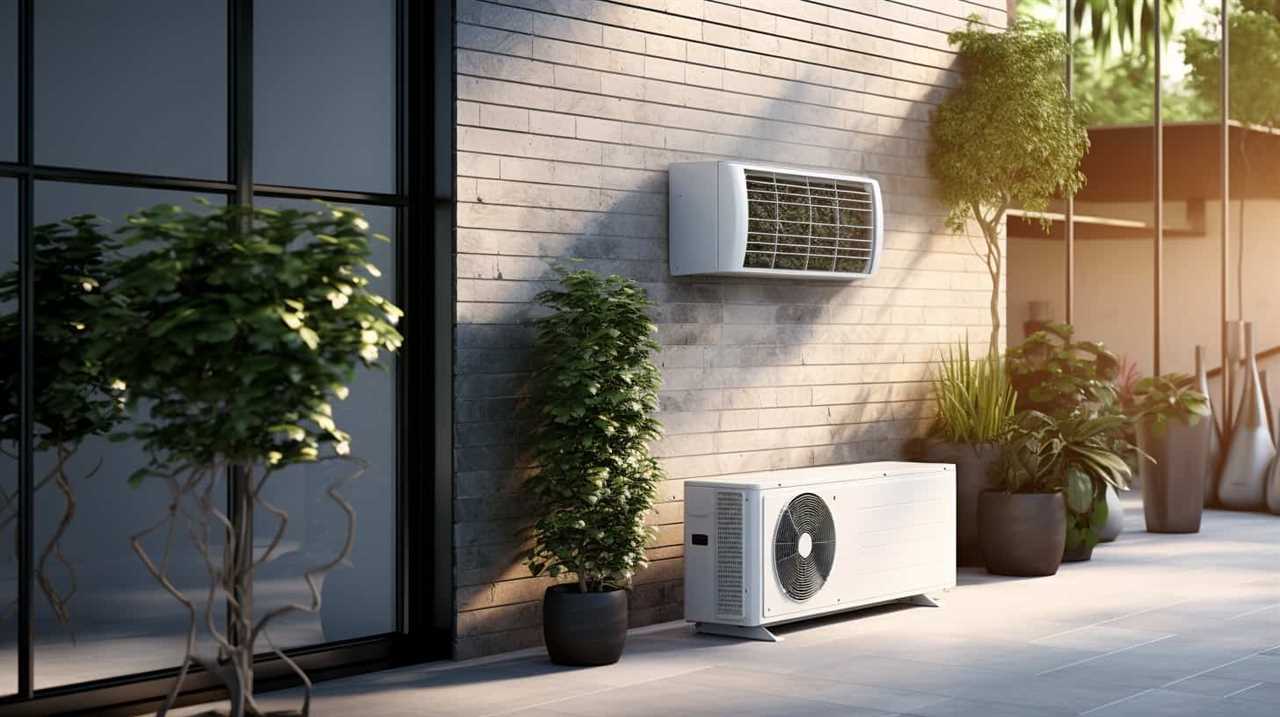
Once we’ve found the right installer, we can move on to securing financing and incentives for our renewable heat pump project.
Securing Financing and Incentives
By exploring available financing options and incentives, we can make our transition to renewable heat pumps more affordable and financially beneficial. Here are four ways to secure financing and take advantage of government incentives:
-
Research financing options: Look into loans, grants, and other financial assistance programs specifically designed for renewable energy projects. Many banks and lending institutions offer favorable terms and low-interest rates for energy-efficient upgrades.
-
Check for government incentives: Governments often provide incentives such as tax credits, rebates, and subsidies for installing renewable energy systems. Stay updated on local, state, and federal programs that can help offset the upfront costs of switching to a renewable heat pump.
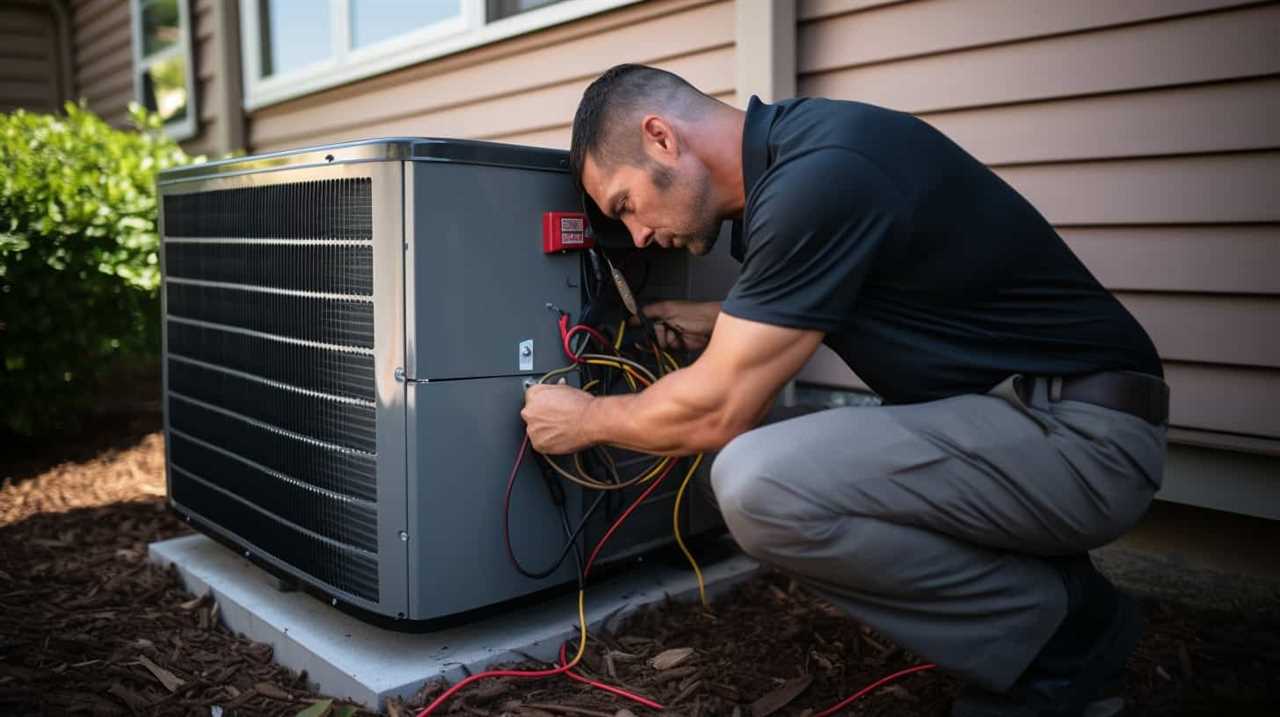
-
Explore energy efficiency programs: Some utility companies offer energy efficiency programs that provide financial incentives for upgrading to energy-efficient heating systems. These programs can help reduce the overall cost of installing a renewable heat pump.
-
Consult with professionals: Speak with renewable energy experts or financial advisors who specialize in energy projects. They can guide you through the financing and incentive options available in your area and help you choose the best path forward.
Securing financing and taking advantage of government incentives can significantly reduce the financial burden of switching to renewable heat pumps. With careful research and planning, you can make the transition more affordable and contribute to a greener future.
Preparing Your Home for Installation
Installers will assess the current heating system and make any necessary modifications before installing the renewable heat pump. This step is crucial in ensuring the smooth transition to a more energy-efficient home. As part of the home renovation process, the installers will evaluate the existing heating system’s compatibility with the renewable heat pump. They may need to make adjustments to the ductwork or electrical system to accommodate the new equipment. By optimizing the home’s infrastructure, the renewable heat pump can operate at its full potential, maximizing energy efficiency.
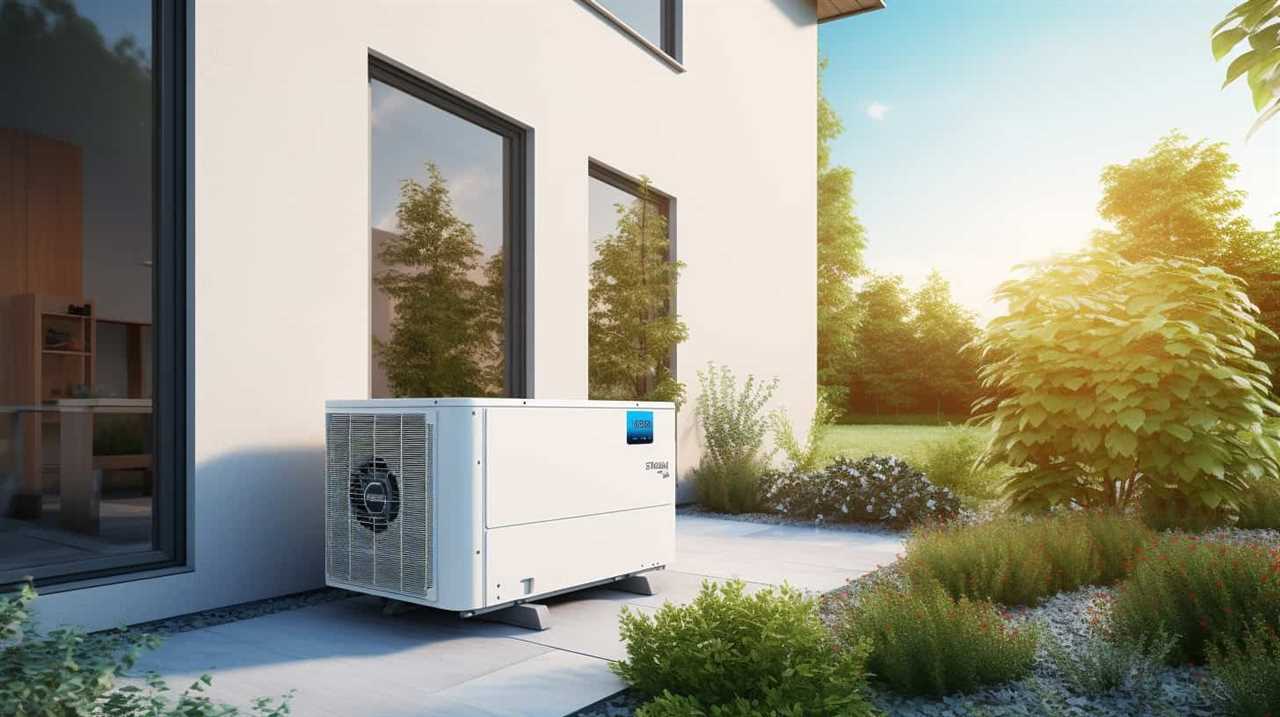
To further illustrate the benefits of this preparation, consider the following table:
| Before | After |
|---|---|
| High energy bills | Lower energy bills |
| Inefficient heating | Increased heating efficiency |
| Environmental impact | Reduced carbon footprint |
| Uncomfortable living conditions | Improved comfort |
| Limited control over temperature | Enhanced temperature control |
Once the necessary modifications are complete, the installation process can begin smoothly, bringing us one step closer to a more sustainable and efficient heating system.
The Installation Process Explained
When it comes to the installation process of renewable heat pumps, there are a few key points to consider.
Firstly, the time and cost factors involved can vary depending on the complexity of the installation and the size of your home.
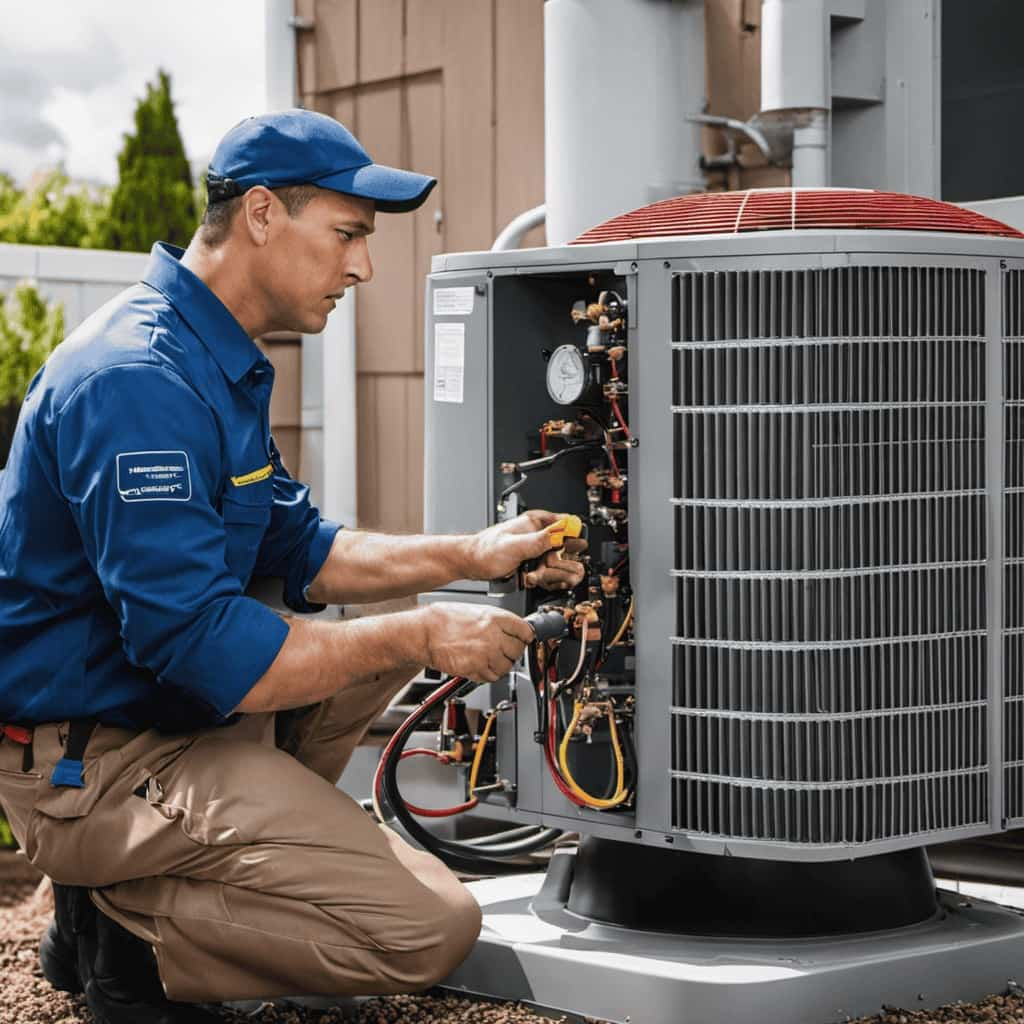
Secondly, it’s important to hire professionals with the necessary expertise and qualifications to ensure a successful installation.
Time and Cost Factors
During the installation process of switching to renewable heat pumps, we carefully assess the time and cost factors involved. Efficient time management and budget planning are crucial to ensure a smooth transition.
Here are four key considerations:
-
Site Assessment: We conduct a thorough evaluation of your property to determine the suitability and requirements for installing a heat pump. This includes assessing the space available, insulation, and electrical infrastructure.
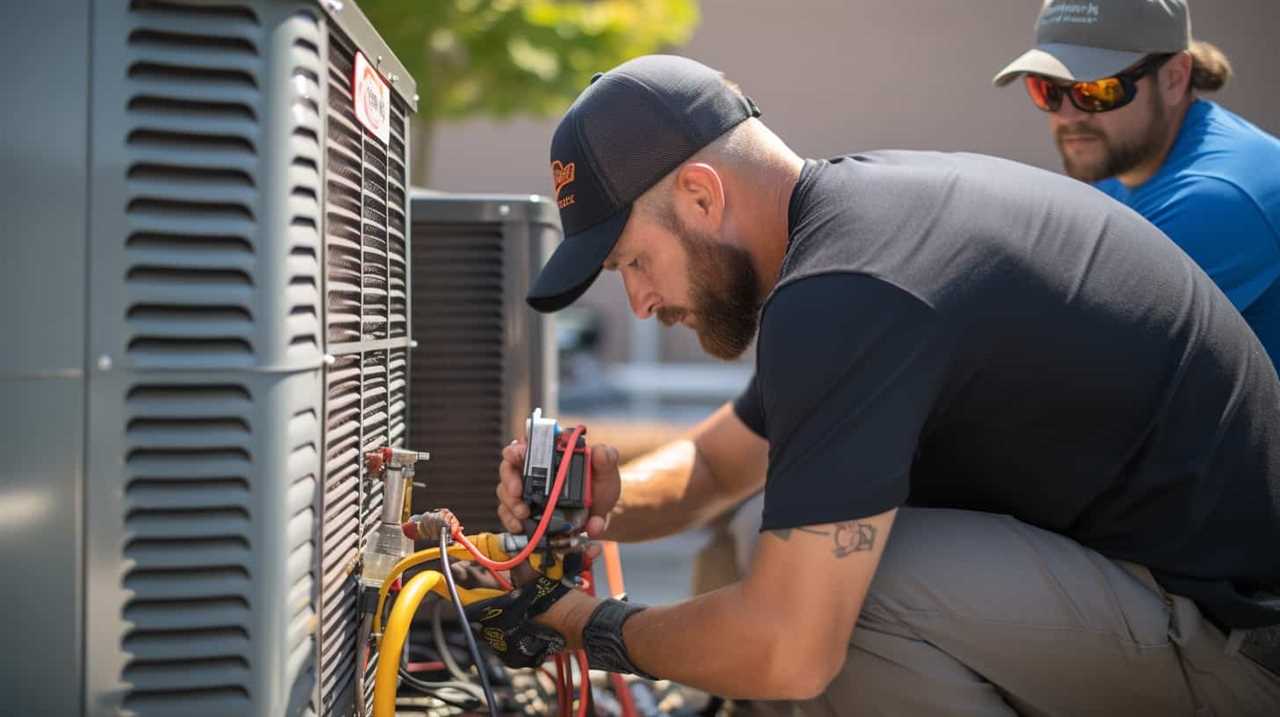
-
System Design: Our experts design a customized heat pump system based on your specific heating and cooling needs. This involves selecting the right size, type, and configuration of heat pumps, as well as optimizing the system for maximum energy efficiency.
-
Installation Process: Our skilled technicians handle the installation process, including the placement of the heat pump unit, connection to the existing heating system, and electrical wiring. We ensure proper installation to guarantee optimal performance and longevity.
-
Commissioning and Testing: After installation, we thoroughly test and commission the heat pump system to ensure it’s working efficiently and effectively. This includes checking for any potential leaks, calibrating controls, and verifying the overall system performance.
Expertise and Qualifications
To ensure a successful installation process, our team of experts possess the necessary expertise and qualifications. We understand the complexities of renewable heat pump systems and have the knowledge and skills required to handle the installation with precision and efficiency.
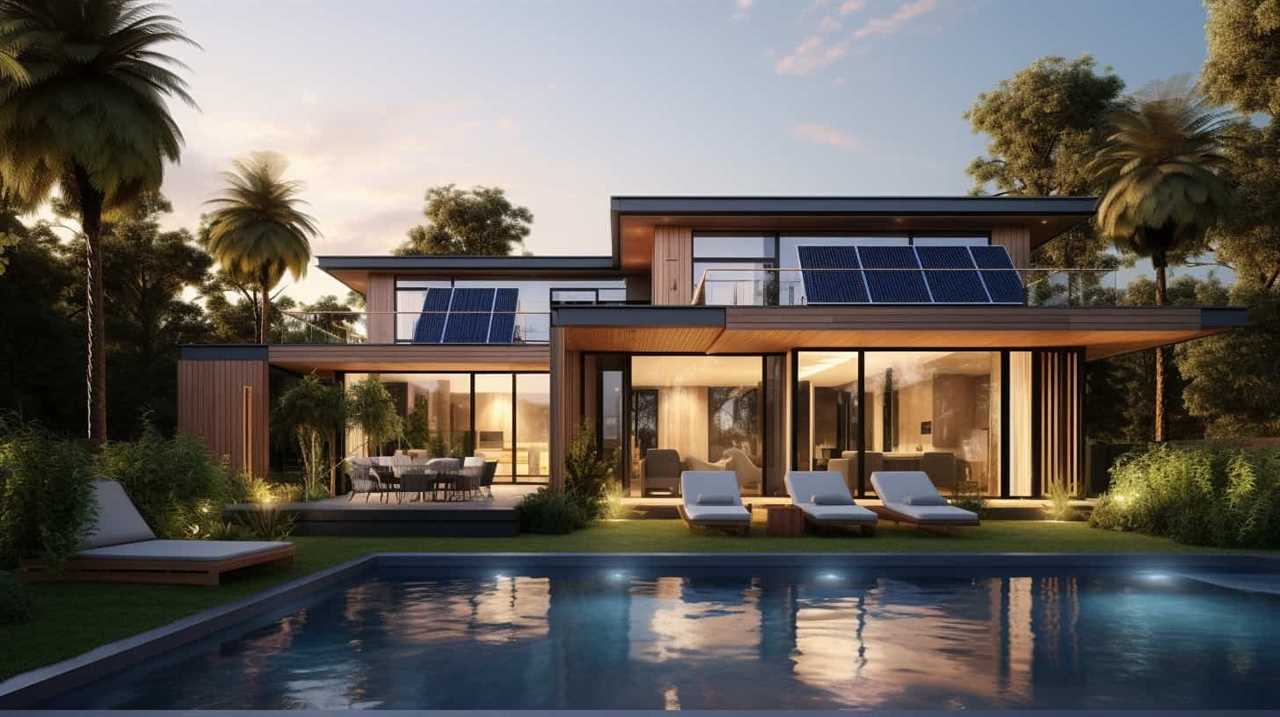
Our team consists of highly trained professionals who’ve undergone extensive training and have obtained relevant certifications in the field. We stay updated with the latest advancements in renewable energy technologies, allowing us to provide innovative solutions to our clients.
Our expertise in renewable heat pump installations ensures that we can navigate any challenges that may arise during the process. By choosing our qualified team, you can have peace of mind knowing that your switch to a renewable heat pump will be handled by experts who are committed to delivering exceptional results.
Maintaining and Optimizing Your Heat Pump
We should regularly clean and replace the filters in our heat pump every three months to ensure optimal performance. Dirty filters can restrict airflow and reduce the efficiency of the heat pump, leading to higher energy consumption.
In addition to filter maintenance, there are several other ways to maintain and optimize our heat pump for maximum energy efficiency:
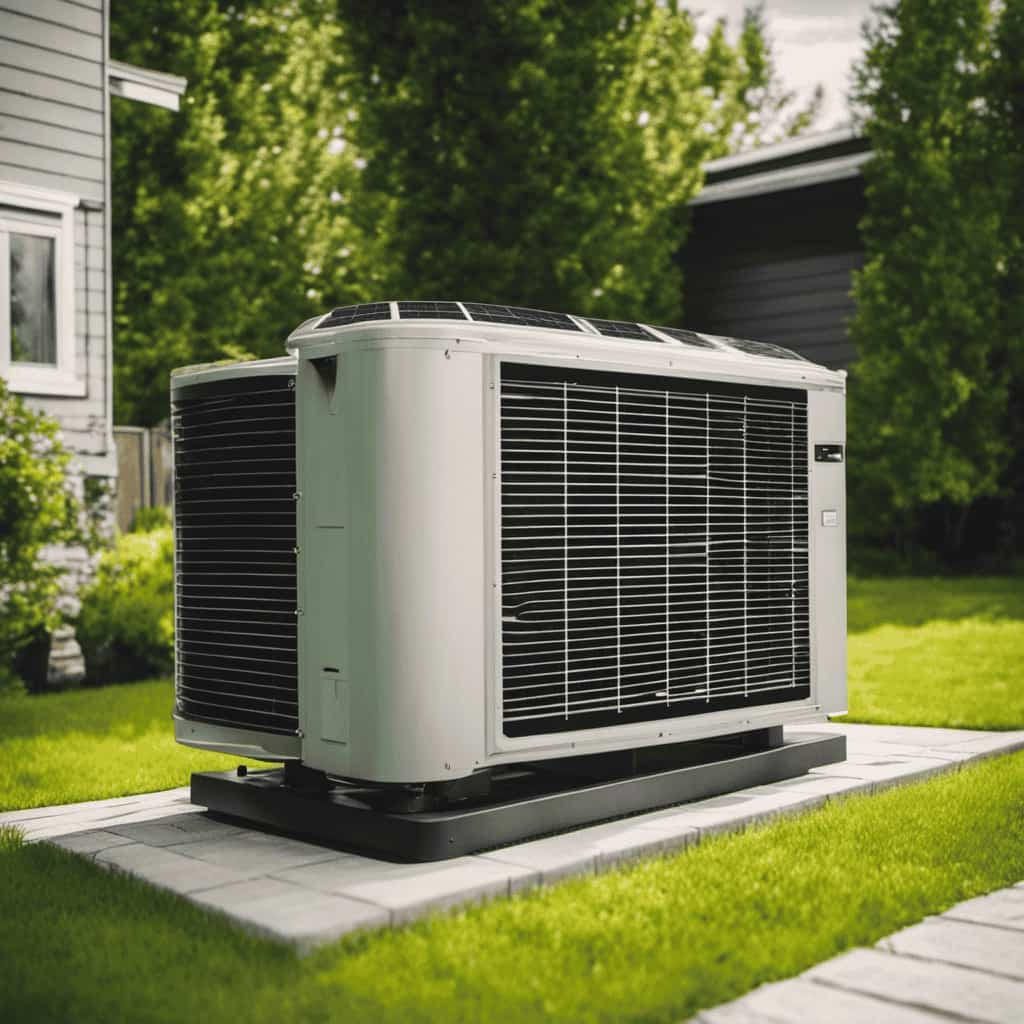
-
Schedule regular professional maintenance: Annual inspections and tune-ups by qualified technicians can identify and fix any issues before they become major problems.
-
Keep the outdoor unit clean: Regularly remove debris, leaves, and dirt from the outdoor unit to prevent airflow restrictions and improve heat transfer.
-
Maintain proper insulation: Adequate insulation in our homes can reduce heat loss or gain, allowing the heat pump to operate more efficiently.
-
Use a programmable thermostat: By setting temperature schedules and optimizing settings, a programmable thermostat can help save energy and improve comfort levels.
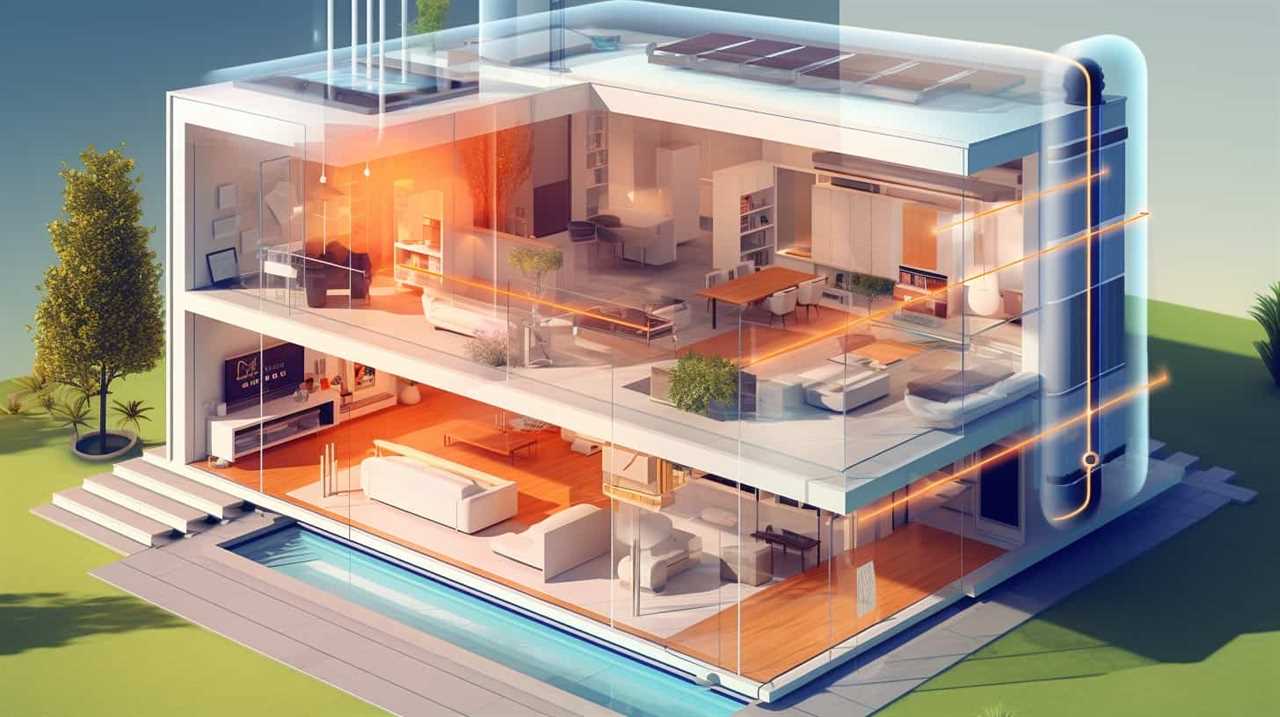
Monitoring Energy Usage and Savings
With the help of smart meters and energy monitoring devices, we can track our energy usage and savings by collecting data on a regular basis. Energy monitoring allows us to have a clear understanding of how much energy our heat pump is consuming and how much we’re saving compared to traditional heating systems.
By tracking our energy usage, we can identify areas where we can improve efficiency and reduce energy waste. This data-driven approach empowers us to make informed decisions about our energy consumption and take steps to optimize our heat pump’s performance.
Additionally, monitoring our energy usage and tracking savings allows us to set goals and see the tangible results of our efforts, motivating us to continue striving for energy efficiency and sustainability.
Troubleshooting Common Heat Pump Issues
When encountering common heat pump issues, our first step should be to check for simple solutions before calling a professional. Here are four troubleshooting tips to help resolve some of the most common heat pump issues:
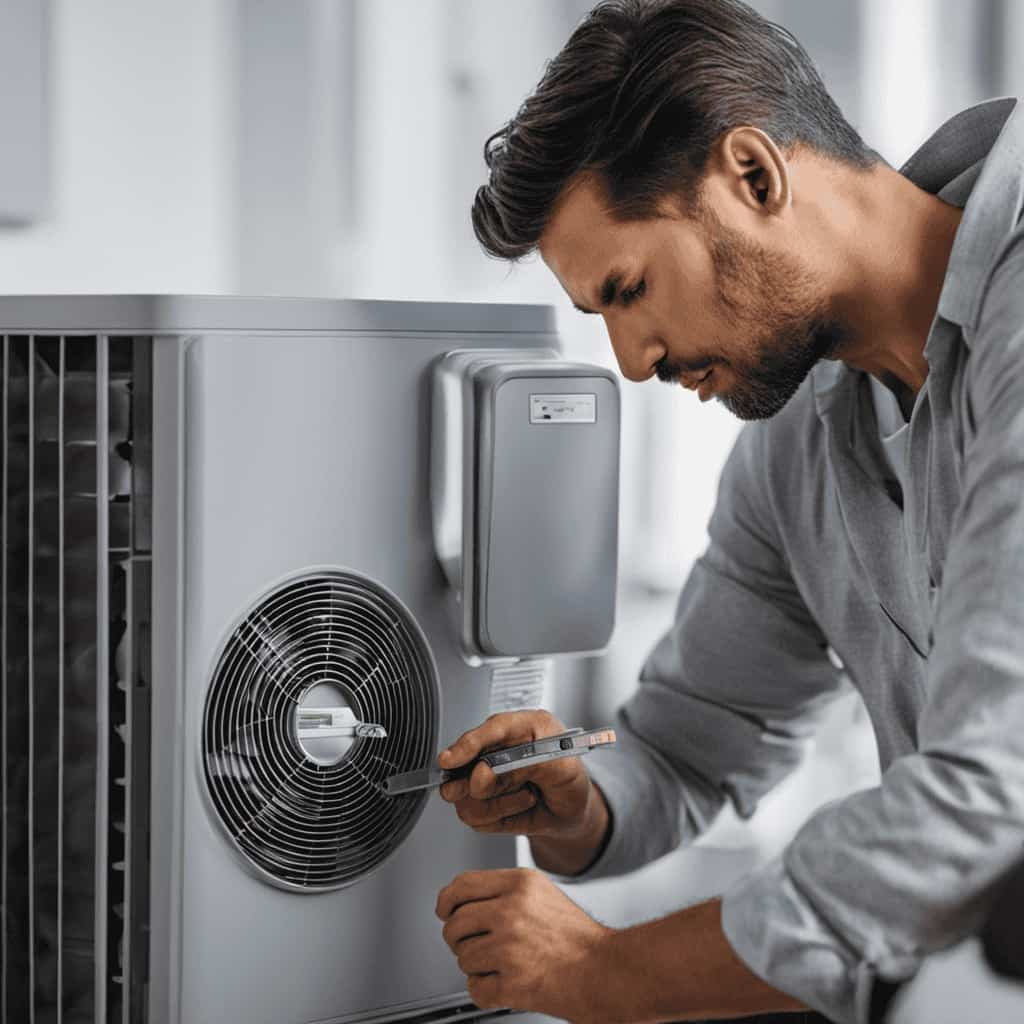
-
Heat Pump Noise: If you notice unusual noises coming from your heat pump, such as grinding or rattling, it could indicate a problem with the fan or motor. Check for any loose components and tighten them if necessary. If the noise persists, it may be best to contact a professional technician for further inspection.
-
Heat Pump Defrost Issues: If your heat pump is constantly going into defrost mode or not defrosting at all, it could be due to a faulty defrost control board or sensor. Check if the defrost sensor is clean and free of any debris. If the issue persists, it’s recommended to consult a professional to diagnose and repair the problem.
-
Inadequate Heating or Cooling: If your heat pump isn’t providing sufficient heating or cooling, check the air filters for any clogs or dirt buildup. Clean or replace them if necessary. Additionally, ensure that the thermostat is set correctly and that the heat pump isn’t obstructed by any objects that may impede airflow.
-
Refrigerant Leaks: If you suspect a refrigerant leak, it’s crucial to contact a professional technician immediately. Signs of a leak include reduced cooling or heating efficiency, hissing sounds, or ice buildup on the refrigerant lines. A trained technician can locate and repair the leak, ensuring optimal performance and reducing energy wastage.
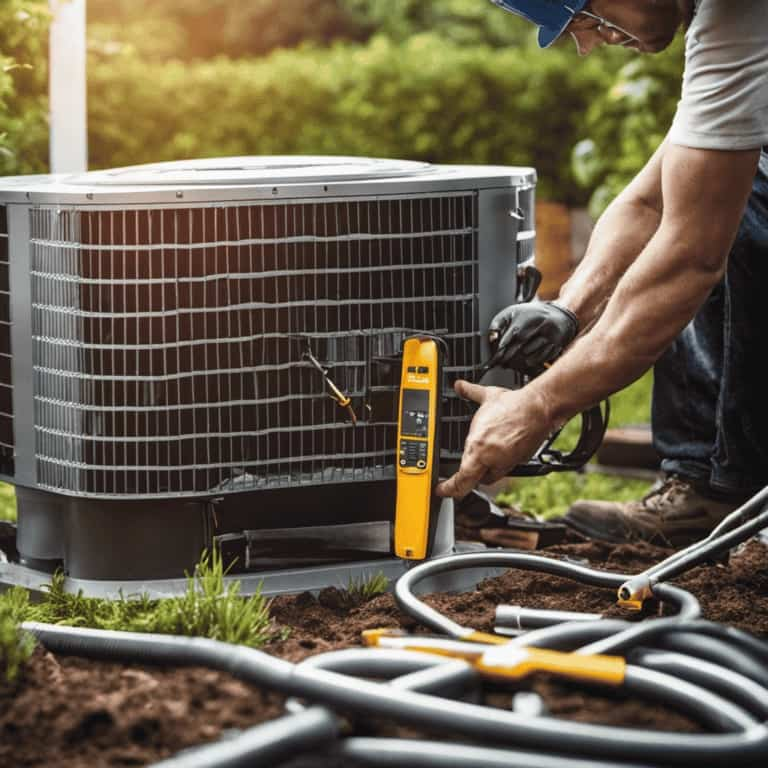
Frequently Asked Questions
Are Renewable Heat Pumps Suitable for All Types of Homes?
Renewable heat pumps can be suitable for many types of homes, improving energy efficiency and providing environmental benefits. They offer innovative solutions for heating and cooling, making them a viable option for those seeking sustainable and efficient heating systems.
How Long Does It Typically Take to Recoup the Cost of Installing a Renewable Heat Pump?
Switching to a renewable heat pump can recoup installation costs within a few years, thanks to the financial benefits of reduced energy bills. Our guide provides a 6-month plan for a seamless transition to renewable heating.
Can I Use a Renewable Heat Pump as the Sole Heating Source for My Home?
Yes, you can use a renewable heat pump as the sole heating source for your home. They are highly efficient and offer many advantages, such as lower energy costs and reduced carbon emissions.
What Kind of Maintenance Is Required for a Renewable Heat Pump?
Maintenance requirements for renewable heat pumps include regular filter cleaning, inspecting and cleaning the outdoor unit, and checking refrigerant levels. Common issues faced with heat pumps are refrigerant leaks, electrical problems, and frozen coils.
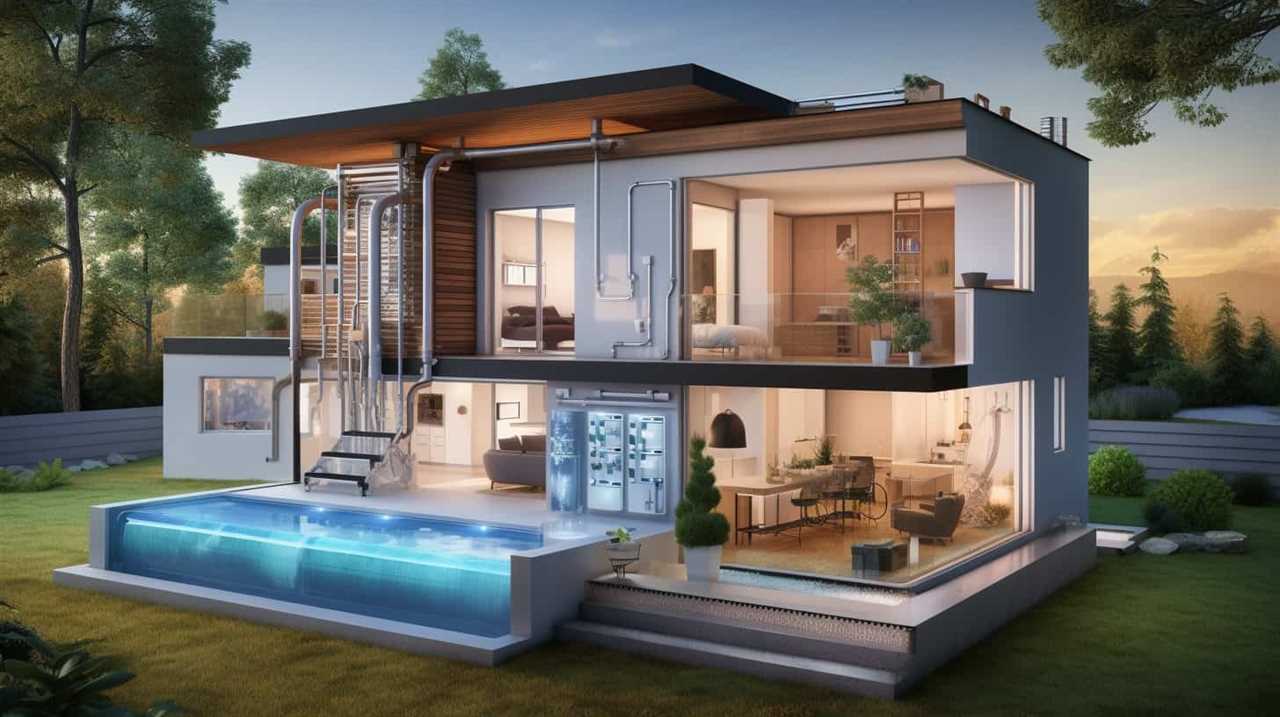
Are There Any Government Regulations or Certifications That Renewable Heat Pump Installers Need to Adhere To?
Yes, government regulations and certifications are crucial for renewable heat pump installers. Without them, we risk subpar installations and potential safety hazards. Adhering to these standards ensures quality and promotes innovation in the industry.
Conclusion
Switching to renewable heat pumps is a smart choice for homeowners looking to reduce their carbon footprint and save on energy costs. By following this 6-month guide, you can confidently navigate the process of understanding, assessing, and choosing the right heat pump system for your home.
With the help of qualified installers, securing financing and incentives, and maintaining and optimizing your heat pump, you can enjoy the benefits of lower energy usage and savings.
Take the leap towards a greener and more sustainable future today.
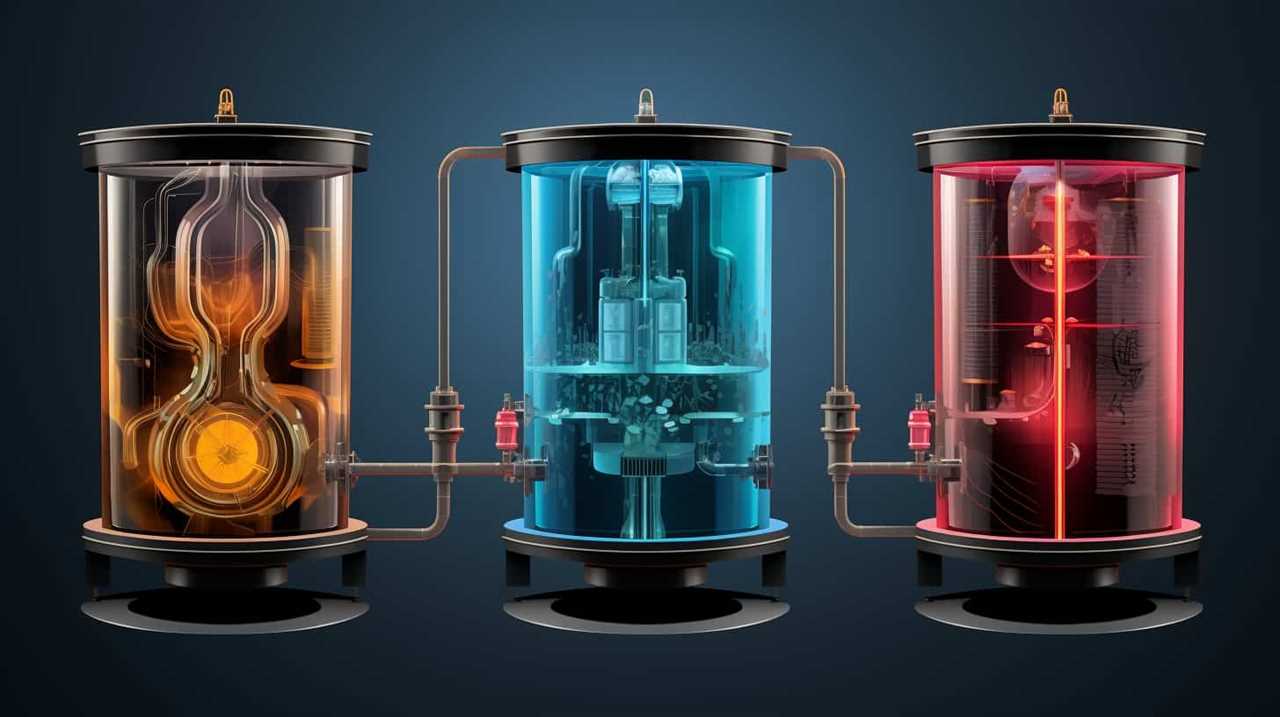
Renewable Energy Sources
Experts Praise Renewable Energy Solutions for Heat Pumps

We have discovered a groundbreaking advancement in the field of heating and cooling.
Experts are praising renewable energy solutions for heat pumps, and for good reason. These innovative technologies not only provide efficient and cost-effective heating and cooling but also have a significantly lower impact on the environment.
From harnessing the power of solar energy to exploring geothermal and wind sources, we’re diving into the possibilities of renewable energy for heat pumps.
Join us as we explore these sustainable solutions and their promising benefits.
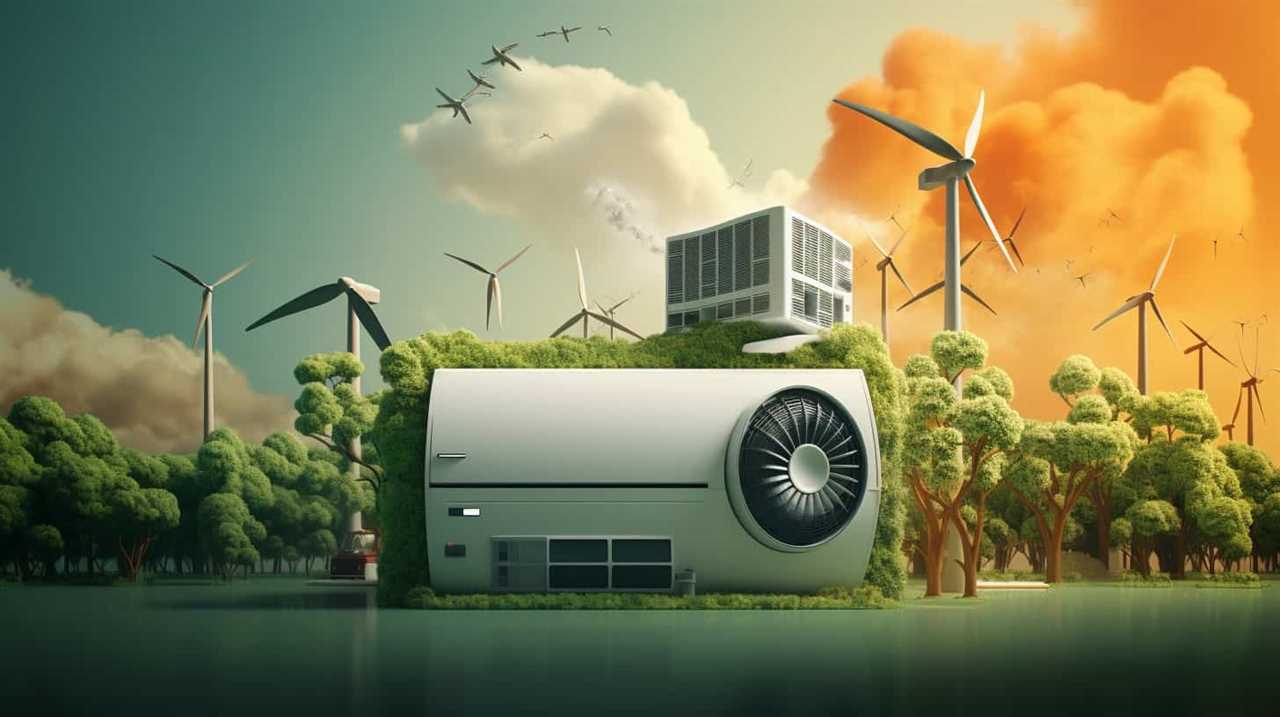
Key Takeaways
- Government incentives, such as tax credits and grants, are driving the increasing demand for renewable energy solutions for heat pumps.
- Heat pumps offer significant energy efficiency advantages compared to traditional heating systems, saving on energy bills and reducing carbon footprints.
- Renewable energy sources like solar, geothermal, wind, and biomass can power heat pumps, contributing to a greener future and lower energy costs.
- Heat pumps significantly decrease a building’s carbon footprint, improve air quality, and reduce environmental pollution.
The Growing Need for Renewable Energy Solutions
We believe that there’s a significant increase in the demand for renewable energy solutions. The importance of government incentives can’t be overstated in driving this demand. By offering financial benefits and support, governments can encourage businesses and individuals to transition to renewable energy sources.
These incentives can include tax credits, grants, and subsidies, which make renewable energy solutions more financially viable and attractive.
Moreover, the role of technology advancements can’t be ignored. Innovations in renewable energy technologies have made them more efficient, affordable, and accessible. Breakthroughs in solar power, wind turbines, and energy storage systems have revolutionized the renewable energy industry, making it a more reliable and sustainable alternative to traditional energy sources.
As technology continues to advance, the cost-effectiveness and efficiency of renewable energy solutions will only improve, further accelerating their adoption.
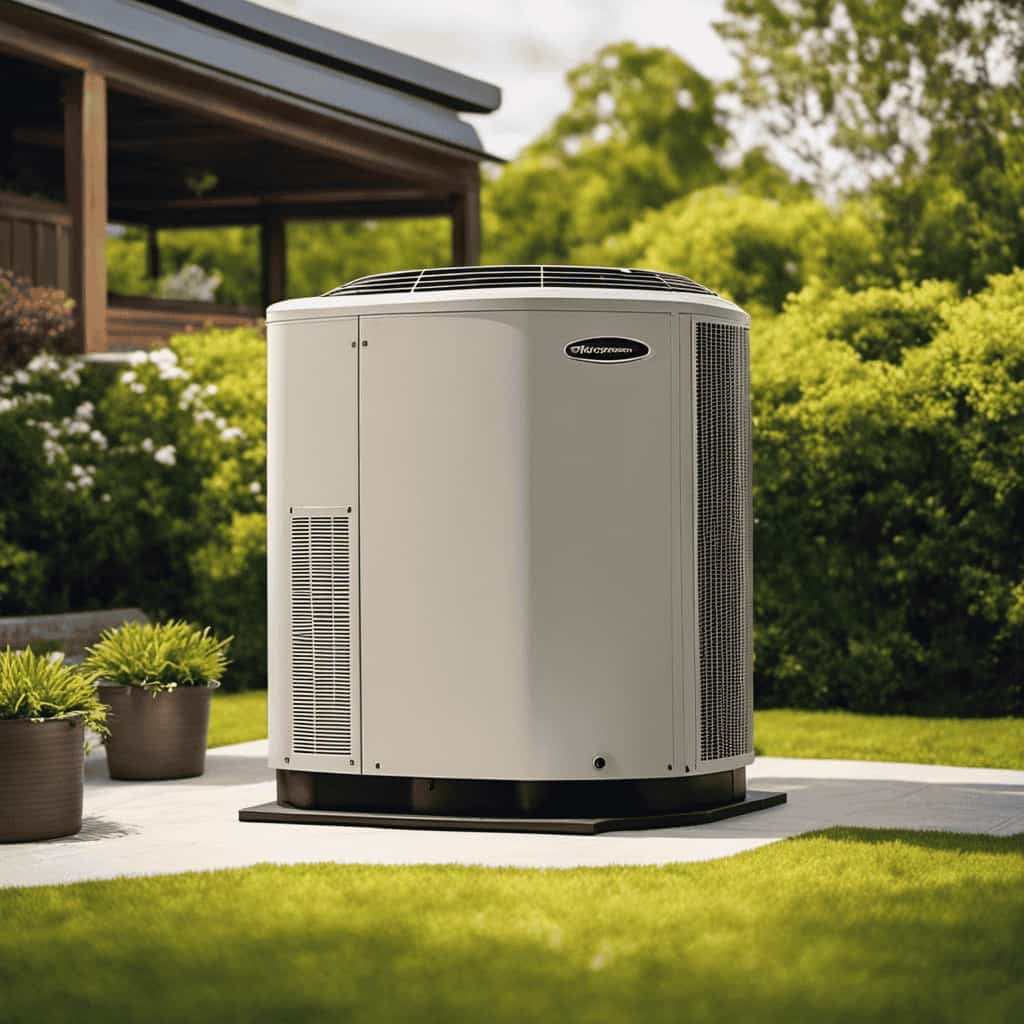
Understanding Heat Pumps and Their Benefits
When it comes to understanding heat pumps and their benefits, there are several key points to consider.
First, heat pumps offer significant energy efficiency advantages compared to traditional heating systems. This means that homeowners can save on their energy bills while reducing their carbon footprint.
Second, heat pumps provide environmental sustainability benefits by utilizing renewable energy sources such as air, water, or ground heat.
Lastly, heat pumps are also cost-effective in the long run, as they can provide both heating and cooling capabilities, eliminating the need for separate systems.
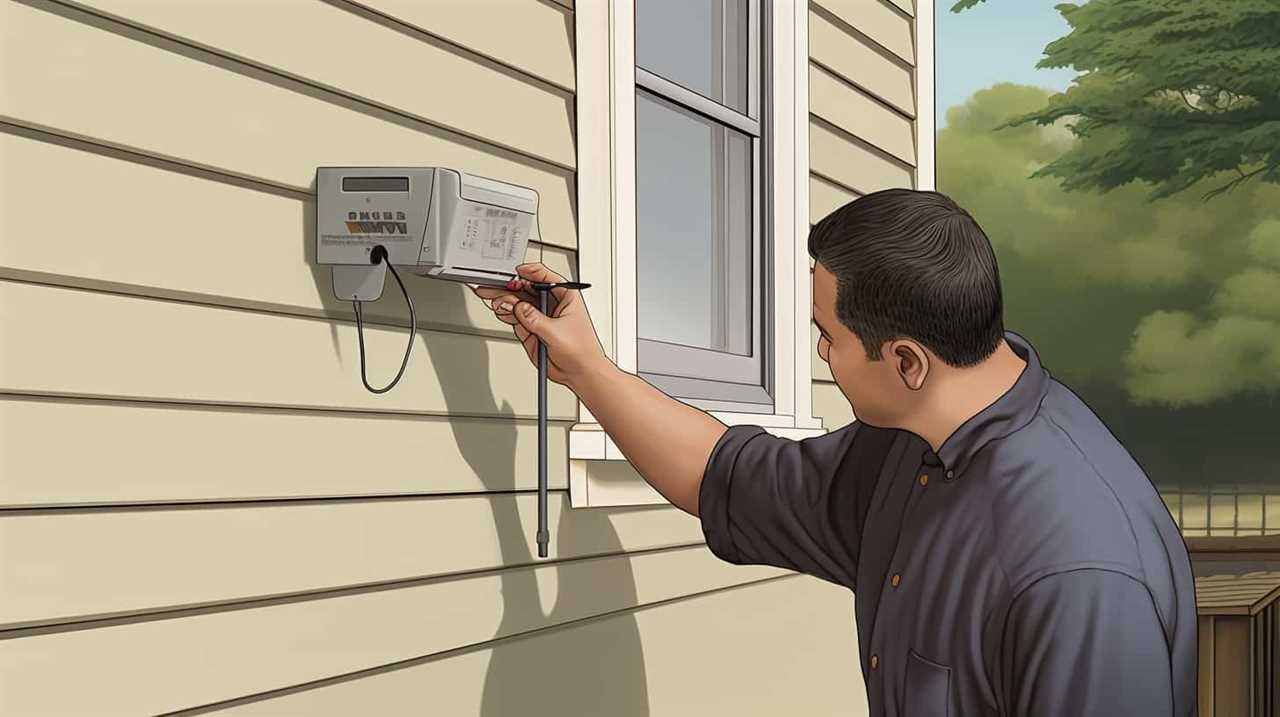
Energy Efficiency Advantages
Highlighting the energy-saving capabilities of heat pumps, experts commend their efficiency advantages in reducing carbon emissions. Heat pumps are known for their ability to transfer heat from one location to another, rather than generating heat directly. This process requires significantly less energy compared to traditional heating systems, resulting in substantial energy savings.
Additionally, heat pumps can be powered by renewable energy sources such as solar or geothermal energy, further reducing their carbon footprint. By leveraging these energy-efficient technologies, individuals and businesses can contribute to a greener future while enjoying the benefits of reduced energy costs.
The efficiency advantages of heat pumps make them a viable and innovative solution for those seeking sustainable heating and cooling options.
Environmental Sustainability Benefits
Experts commend the environmental sustainability benefits of heat pumps for their contribution to reducing carbon emissions and promoting renewable energy sources. Heat pumps are a sustainable solution that can significantly decrease a building’s carbon footprint. By utilizing renewable energy sources such as air, water, or ground, heat pumps effectively reduce greenhouse gas emissions and dependence on fossil fuels. This not only helps combat climate change but also improves air quality and reduces environmental pollution.
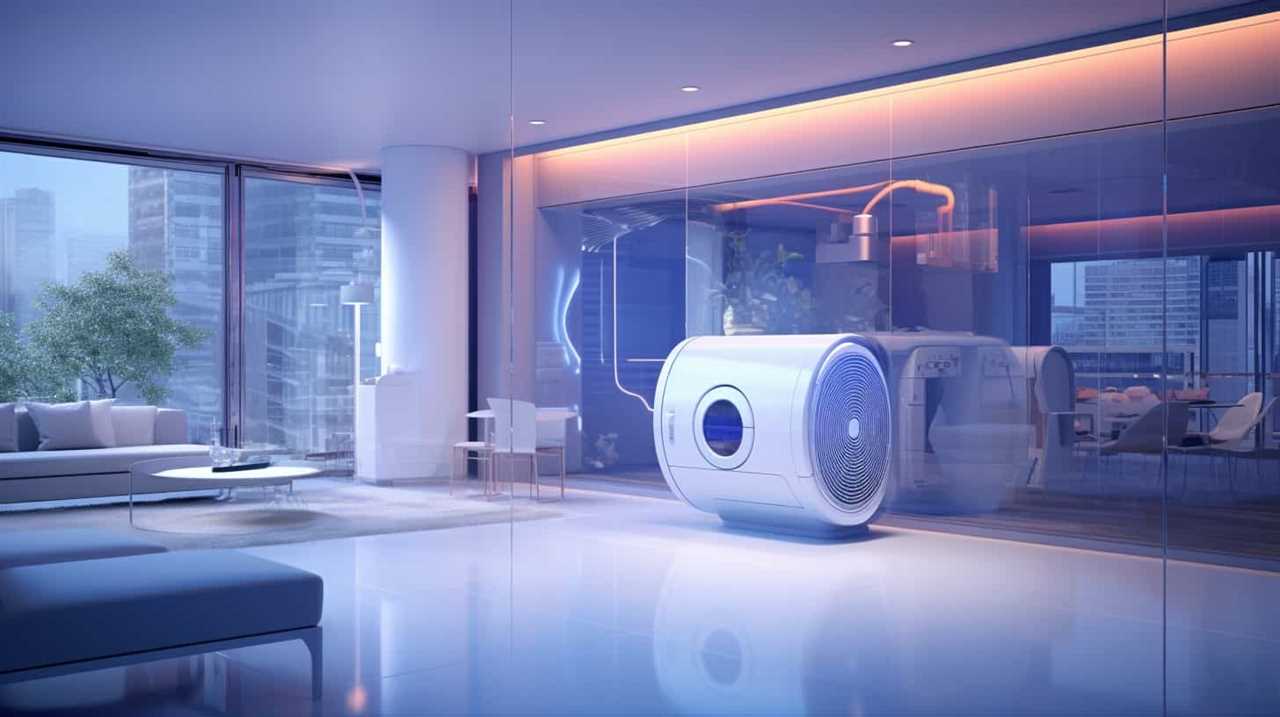
Heat pumps are highly efficient in converting energy, making them an environmentally friendly choice for heating and cooling needs. Additionally, heat pumps can also be integrated with other renewable energy systems such as solar panels, further enhancing their environmental benefits.
Cost-Effectiveness of Heat Pumps
We can examine the cost-effectiveness of heat pumps by comparing their energy savings to their initial installation costs. Heat pumps offer several efficiency advantages that make them a cost-effective solution for heating and cooling homes and buildings. Firstly, heat pumps have a high level of energy efficiency, meaning they can provide significant energy savings compared to traditional heating systems. Additionally, heat pumps can be powered by renewable energy sources such as solar or geothermal, further reducing operating costs and environmental impact. To illustrate the potential cost savings, consider the following table:
| Heating System | Initial Installation Cost | Annual Energy Savings |
|---|---|---|
| Heat Pump | $5,000 | $800 |
| Gas Furnace | $3,000 | $400 |
| Electric Heater | $1,500 | $200 |
As shown in the table, the heat pump offers the highest annual energy savings, making it a cost-effective solution in the long run.
Harnessing the Power of Solar Energy for Heat Pumps
Solar energy offers us a limitless and sustainable source of power for our heat pumps. By integrating solar energy into our heat pump systems, we can maximize efficiency and reduce our dependence on traditional energy sources. Here are three ways we can harness the power of solar energy for heat pumps:

-
Photovoltaic (PV) Panels: Installing PV panels on the roof or in the vicinity of the property allows us to capture sunlight and convert it into electricity to power the heat pump. This not only reduces our carbon footprint but also lowers energy costs.
-
Solar Thermal Systems: Utilizing solar thermal systems, we can directly heat the fluid in the heat pump, increasing its efficiency and reducing the need for additional energy sources. These systems use sunlight to heat the fluid, which is then circulated through the heat pump to provide heating or cooling.
-
Solar Heat Pumps: Solar heat pumps combine the power of solar energy with the efficiency of heat pumps. These systems use solar energy to drive the heat pump cycle, providing an environmentally friendly and cost-effective solution for heating and cooling.
Exploring Geothermal Energy as a Sustainable Solution
As we continue to explore sustainable solutions for heat pumps, it’s important to consider the potential of geothermal energy. Geothermal energy exploration offers a promising avenue for sustainable heating solutions.
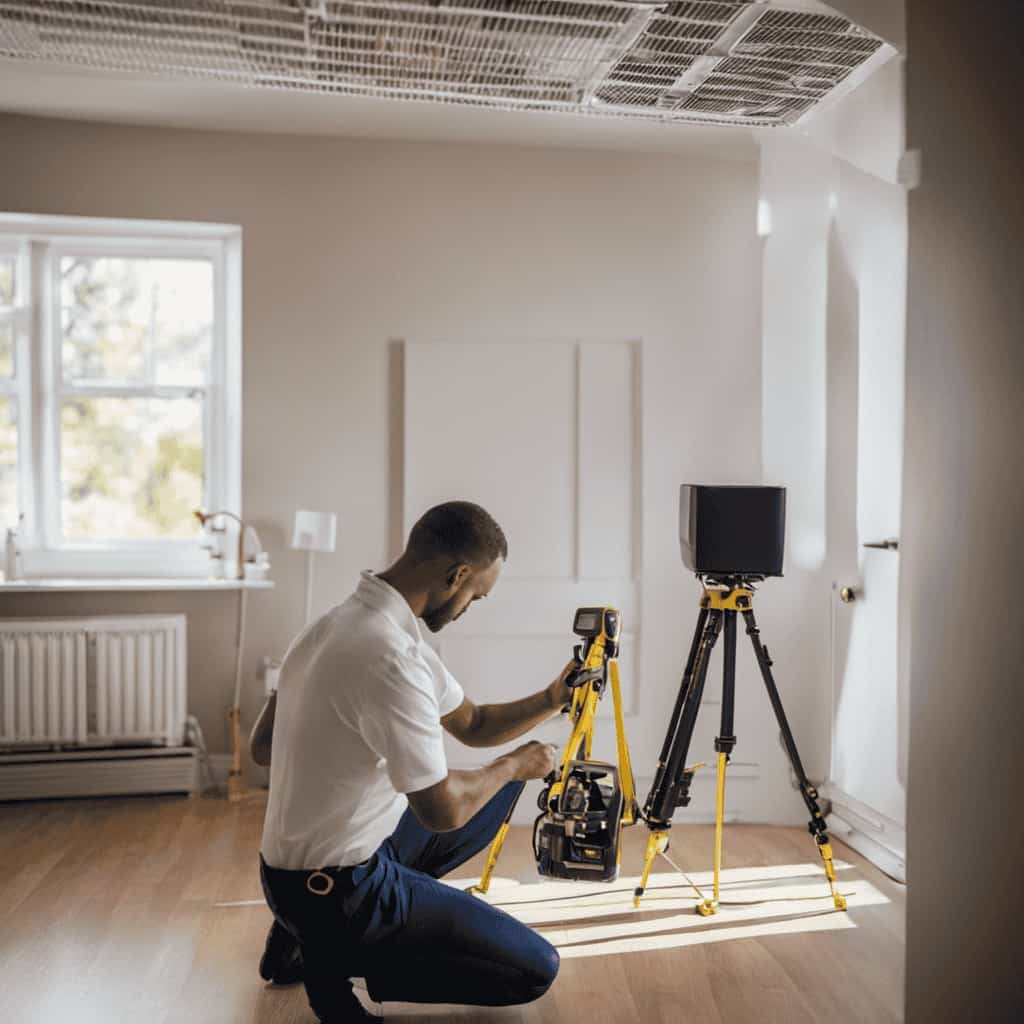
Geothermal heat pumps utilize the Earth’s natural heat to provide both heating and cooling for residential and commercial buildings. This renewable energy source taps into the constant temperature of the ground, where temperatures remain relatively stable throughout the year. By harnessing this stable heat source, geothermal heat pumps can provide efficient and consistent heating, reducing reliance on fossil fuels and minimizing greenhouse gas emissions.
Additionally, geothermal energy is renewable and abundant, making it a viable long-term solution for sustainable heating.
Transitioning from geothermal energy exploration, let’s now delve into the topic of wind energy as a promising renewable source for heat pumps.
Wind Energy: A Promising Renewable Source for Heat Pumps
Wind energy is a cost-effective and sustainable option for powering heat pumps. With advances in technology and an increasing focus on renewable sources, harnessing the power of the wind has become a promising solution for meeting energy needs. Here are three reasons why wind energy is an excellent choice for heat pumps:
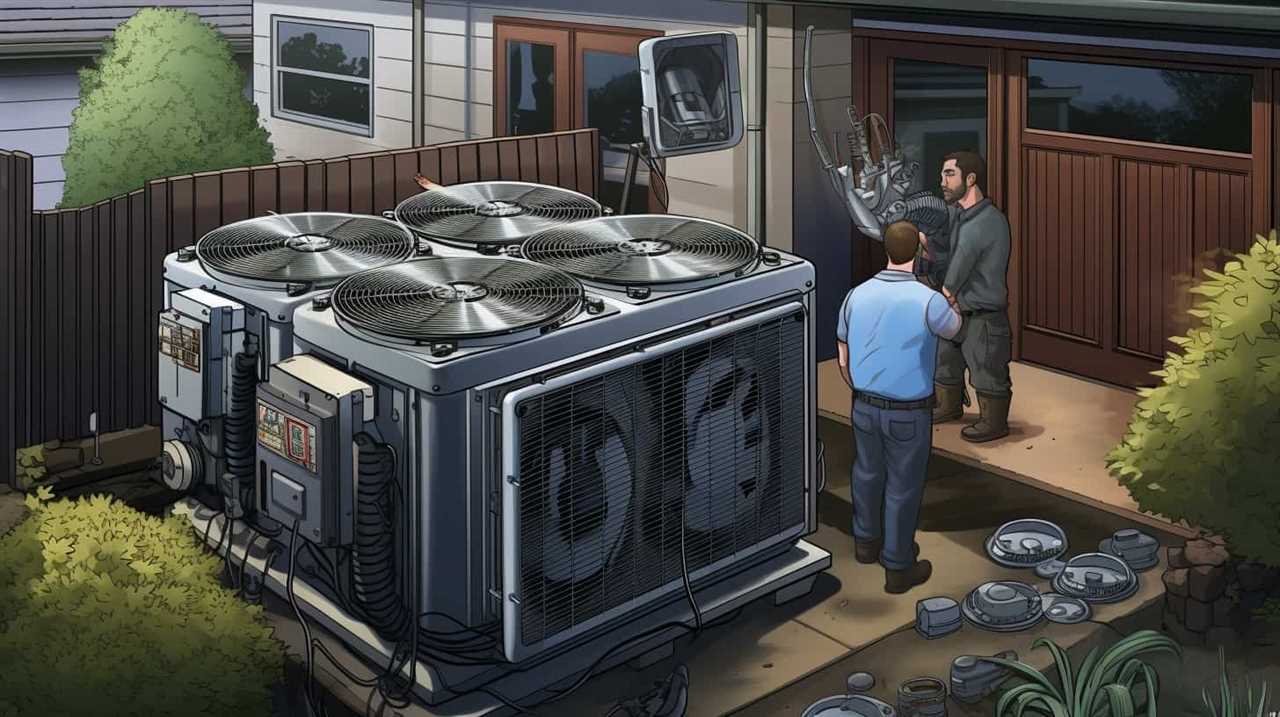
-
Abundant and renewable: Wind is a limitless resource that can be harnessed to generate electricity. Unlike fossil fuels, wind energy is a renewable source that doesn’t deplete over time.
-
Cost-effective: Once a wind turbine is installed, the cost of generating electricity from wind energy is relatively low. This makes it an attractive option for homeowners and businesses looking to reduce their energy costs.
-
Environmental benefits: Wind energy produces zero greenhouse gas emissions, making it a clean and sustainable alternative to traditional energy sources. By harnessing the power of the wind, we can significantly reduce our carbon footprint and mitigate the effects of climate change.
Transitioning from wind energy, let’s now explore biomass as a renewable fuel option for heat pump systems.

Biomass: A Renewable Fuel Option for Heat Pump Systems
Biomass is a sustainable heat source that has gained attention as a renewable fuel option for heat pump systems. It offers numerous benefits, including reducing greenhouse gas emissions and providing a reliable energy supply.
Biomass serves as a viable alternative to traditional fossil fuels, making it a promising solution for meeting heat demands while minimizing environmental impact.
Biomass: Sustainable Heat Source
While biomass is a renewable fuel option for heat pump systems, experts praise its sustainability as a heat source. Biomass refers to organic materials, such as wood pellets, agricultural residues, and dedicated energy crops, that can be burned to produce heat. Here are three reasons why biomass is considered a sustainable heat source:
-
Renewable: Biomass is derived from organic matter, which can be replenished through various means like reforestation and sustainable farming practices. This ensures a continuous supply of biomass for heat generation.
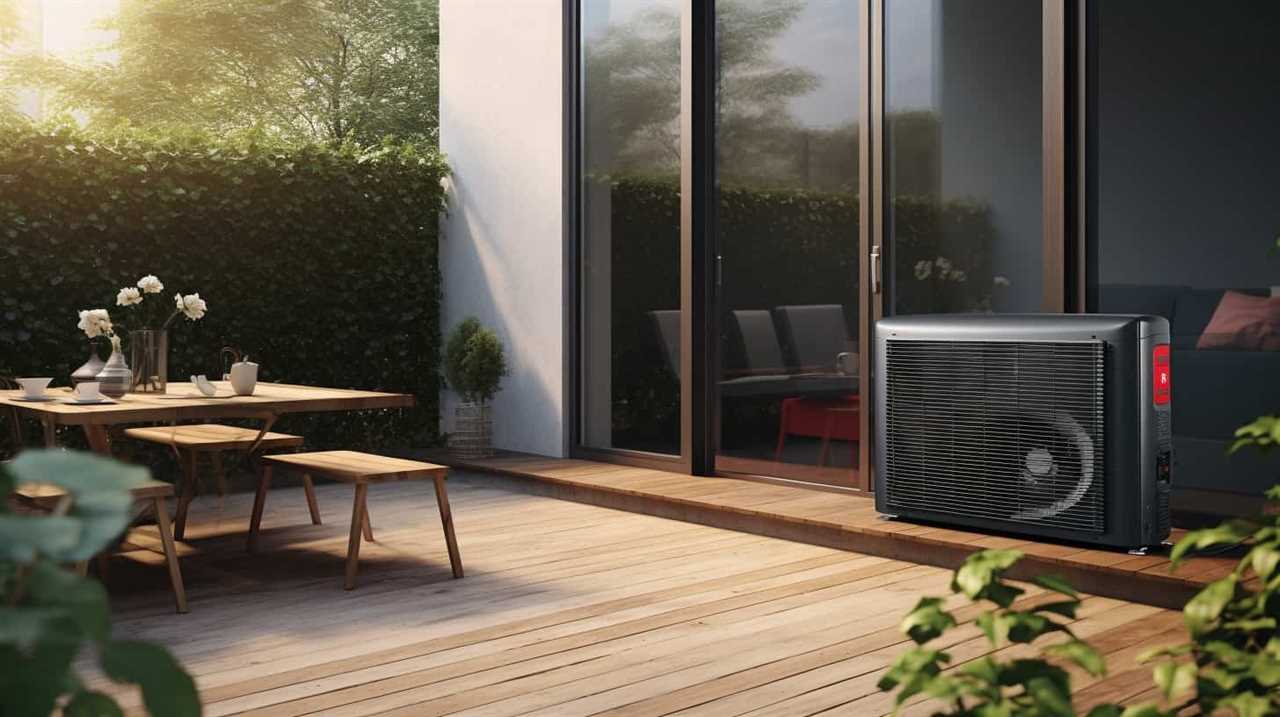
-
Carbon neutral: When biomass is burned, it releases carbon dioxide (CO2) into the atmosphere. However, the CO2 emitted is roughly equal to the amount absorbed by the plants during their growth phase. This makes biomass a carbon-neutral option, as it doesn’t contribute to the net increase of CO2 in the atmosphere.
-
Local availability: Biomass can be sourced locally, reducing dependence on fossil fuels and promoting regional economic growth. It provides an opportunity for communities to utilize their own sustainable resources for heat production.
With these benefits, biomass emerges as a promising renewable heat source for heat pump systems, contributing to a greener and more sustainable future.
Benefits of Biomass Fuel
We frequently praise the benefits of biomass fuel as a renewable option for heat pump systems.

Biomass fuel, derived from organic materials such as wood pellets, agricultural waste, and dedicated energy crops, offers several advantages in terms of sustainability and environmental impact.
Firstly, biomass fuel is a carbon-neutral energy source, as the carbon dioxide released during combustion is offset by the carbon absorbed during plant growth. This makes it a viable alternative to fossil fuels, reducing greenhouse gas emissions and mitigating climate change.
Additionally, biomass fuel is readily available and can be sourced locally, reducing dependence on imported energy.
Furthermore, the use of biomass fuel promotes the development of sustainable agriculture and forestry practices.
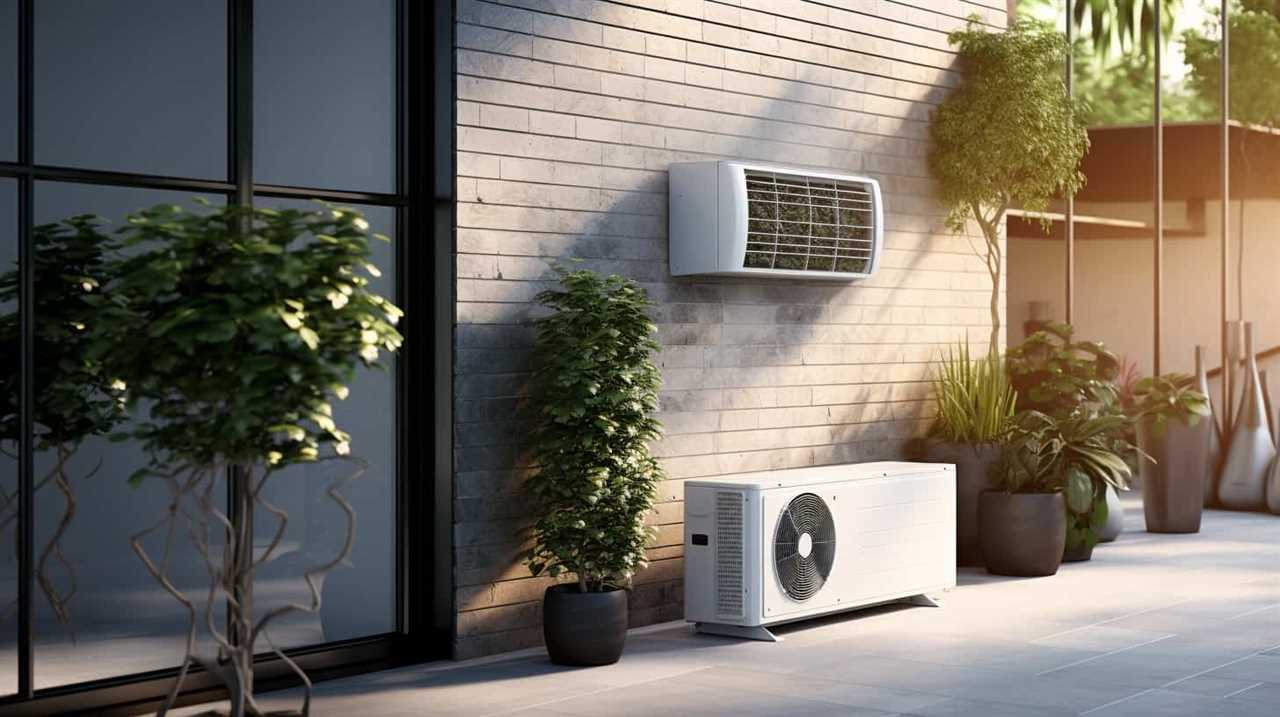
Transitioning to biomass fuel as a renewable energy alternative has the potential to revolutionize heat pump systems and contribute to a more sustainable future.
Biomass: Renewable Energy Alternative
We can achieve a more sustainable and efficient heat pump system by utilizing biomass as a renewable fuel option. Biomass refers to organic matter, such as wood pellets, agricultural waste, or dedicated energy crops, that can be burned to produce heat.
Here are three reasons why biomass is a viable fuel option for heat pump systems:
-
Renewable energy: Biomass is derived from organic materials that can be replenished, making it a renewable energy source. By using biomass as a fuel, we can reduce our dependence on fossil fuels and decrease greenhouse gas emissions.
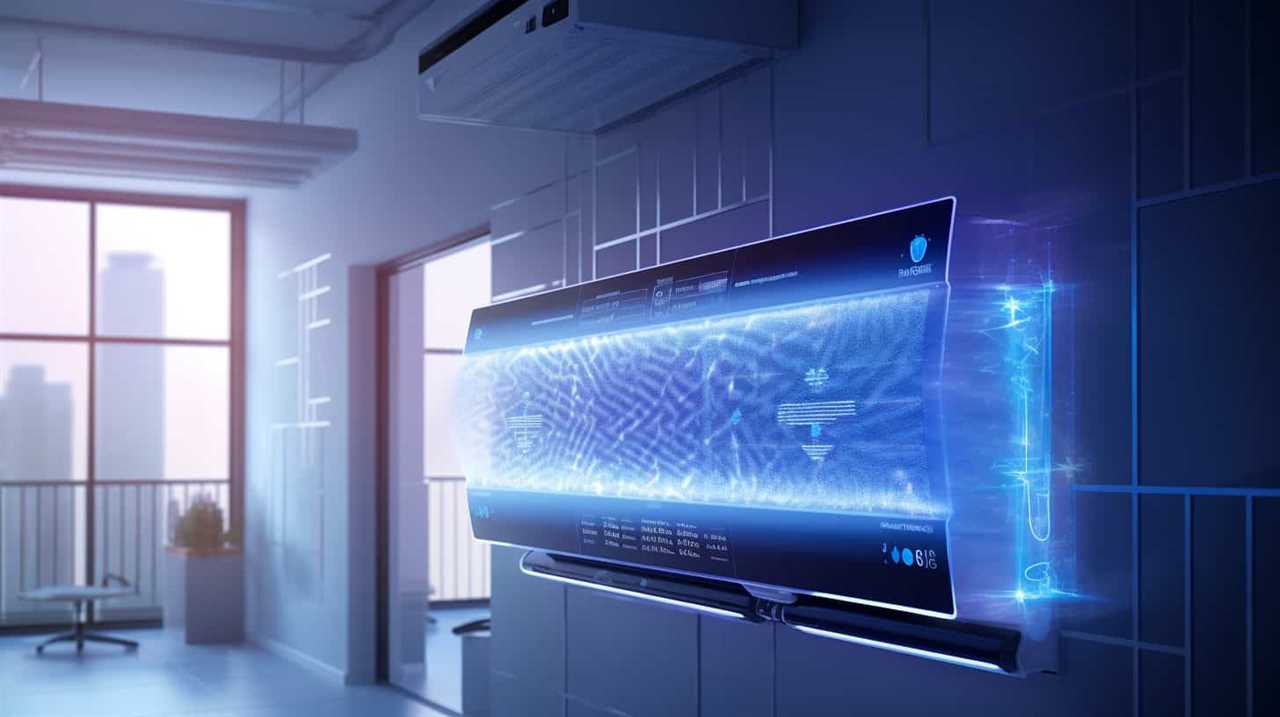
-
Versatility: Biomass can be used in various forms, such as pellets, chips, or logs, making it adaptable to different heat pump systems. This flexibility allows for efficient utilization of biomass as a heat source.
-
Local availability: Biomass fuel options are often locally sourced, reducing transportation costs and promoting regional economic growth. By utilizing biomass heat sources, we can support local communities and reduce reliance on imported fuels.
Transition: Now that we’ve explored the benefits of biomass as a renewable fuel option, let’s move on to discussing hydroelectric power as an efficient energy source for heat pumps.
Hydroelectric Power: An Efficient Energy Source for Heat Pumps
Hydroelectric power has emerged as an efficient energy source for heat pumps in recent years. Its numerous benefits and high efficiency make it an attractive option for those seeking sustainable and innovative solutions.

Hydroelectric power offers several advantages when used as an energy source for heat pumps. Firstly, it is a renewable energy source, meaning it can be continuously replenished. Secondly, it produces minimal greenhouse gas emissions, making it an environmentally friendly option. Lastly, hydroelectric power plants have a long lifespan and can provide a reliable and stable source of energy for heat pumps.
Table: Hydroelectric Power Benefits for Heat Pumps
| Benefits | Description |
|---|---|
| Renewable Energy Source | Hydroelectric power is constantly replenished, ensuring a steady supply. |
| Low Greenhouse Gas Emissions | Hydroelectric power plants produce minimal emissions, reducing environmental impact. |
| Reliable and Stable | Hydroelectric power plants have a long lifespan and can provide consistent energy for heat pumps. |
Evaluating the Environmental Impact of Renewable Energy Solutions
When evaluating the environmental impact of renewable energy solutions, it’s important to consider their long-term sustainability and overall effectiveness. To conduct a thorough evaluation, a sustainability assessment can be carried out, taking into account the following factors:
-
Carbon footprint: Assessing the amount of greenhouse gas emissions produced throughout the lifecycle of the renewable energy solution, including manufacturing, installation, and operation.
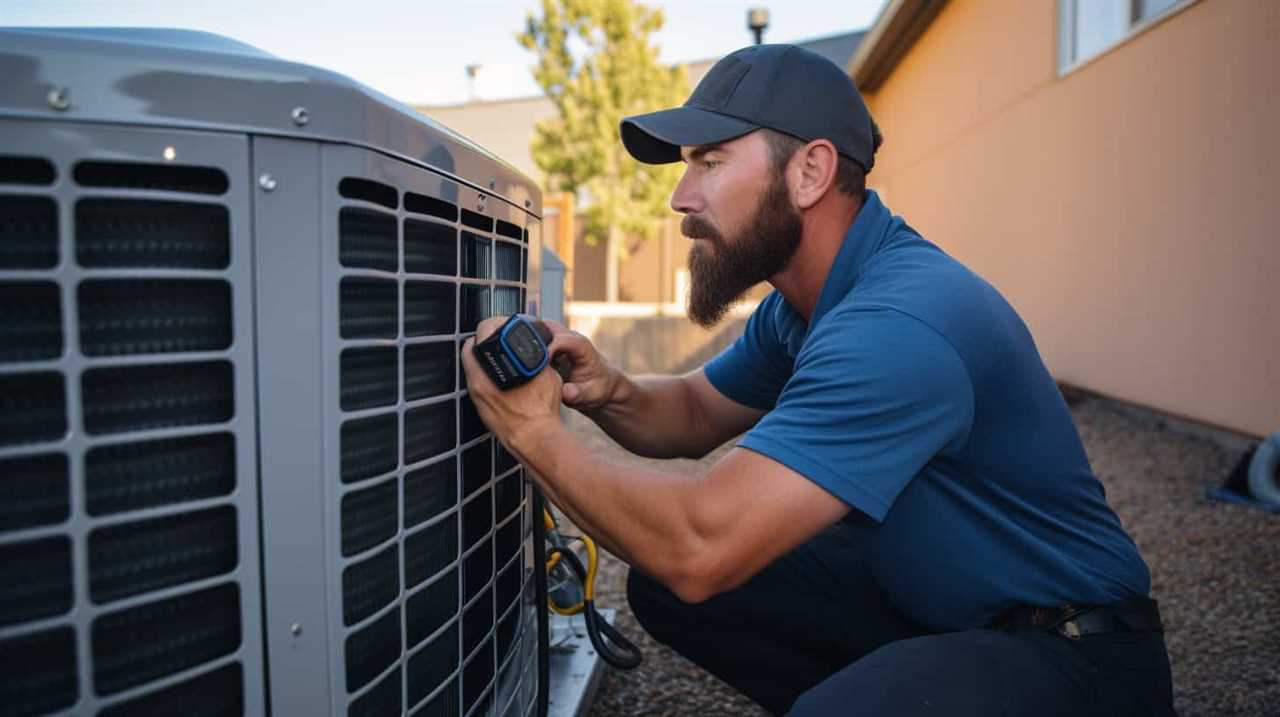
-
Resource depletion: Evaluating the extent to which the renewable energy solution relies on finite resources and its potential to deplete them over time.
-
Ecological impact: Examining the effects of the renewable energy solution on local ecosystems, including habitat disruption, biodiversity loss, and water and air pollution.
By considering these factors, we can determine the true environmental impact of renewable energy solutions and make informed decisions about their implementation.
This evaluation process is crucial in ensuring that our pursuit of renewable energy aligns with our goal of creating a sustainable and innovative future.
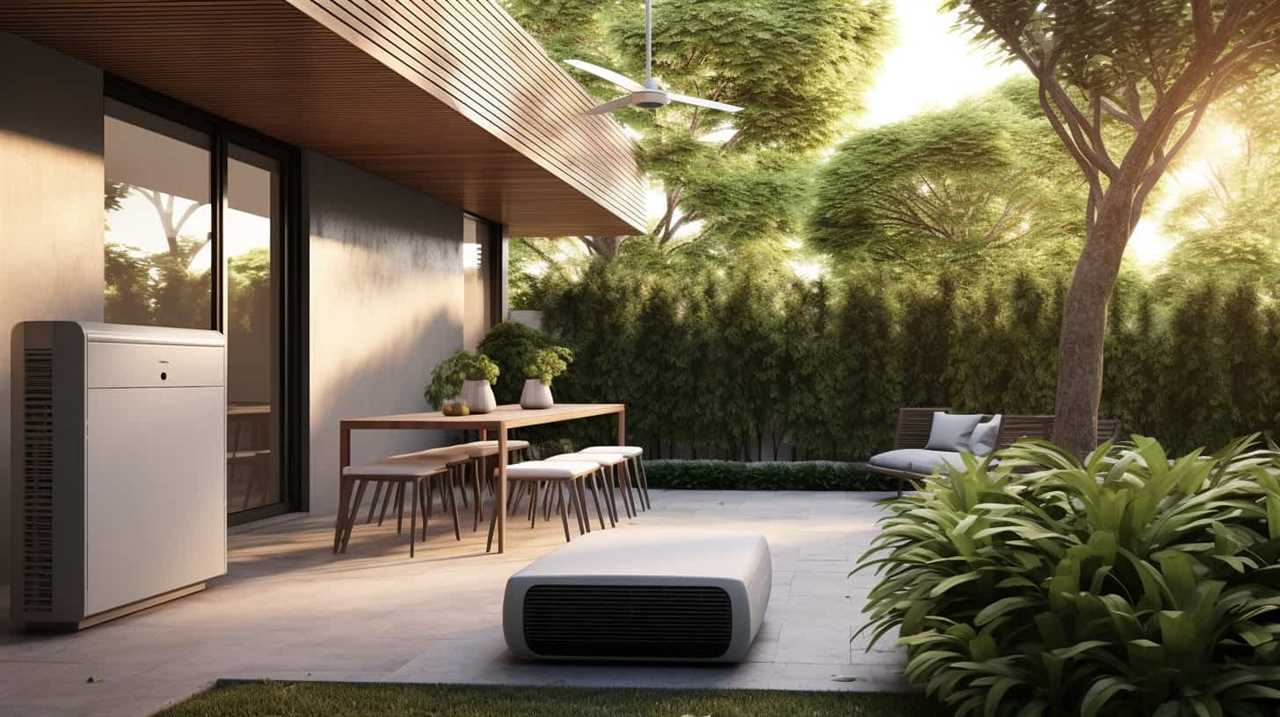
Frequently Asked Questions
What Are the Specific Installation Costs Associated With Heat Pump Systems Powered by Renewable Energy Sources?
Cost comparison for heat pump systems powered by renewable energy sources is an important consideration. We analyze specific installation costs to determine the most efficient and cost-effective solutions. Renewable energy options offer innovative and sustainable alternatives.
How Do Heat Pumps Powered by Renewable Energy Sources Compare to Traditional Heating Systems in Terms of Efficiency and Performance?
Heat pumps powered by renewable energy sources outperform traditional heating systems in terms of energy efficiency. A comparison reveals that these innovative solutions offer superior performance, making them an ideal choice for environmentally conscious consumers.
Are There Any Limitations or Drawbacks to Using Renewable Energy Sources for Heat Pumps?
There are some limitations and drawbacks to using renewable energy sources for heat pumps. These can include higher upfront costs, limited availability of certain energy sources, and potential fluctuations in energy supply.
What Are the Maintenance Requirements for Heat Pump Systems Powered by Renewable Energy Sources?
Maintenance requirements for heat pump systems powered by renewable energy sources depend on the specific system and its components. Regular inspections, cleaning, and filter replacements are necessary to ensure optimal performance and energy efficiency.

Are There Any Government Incentives or Financial Assistance Programs Available for the Installation of Renewable Energy-Powered Heat Pump Systems?
There are indeed government incentives and financial assistance programs available for the installation of renewable energy-powered heat pump systems. These programs can provide significant support and make the transition to renewable energy more affordable for homeowners.
Conclusion
In conclusion, renewable energy solutions for heat pumps offer a ray of hope in our quest for sustainability.
Like a warm breeze on a cold winter day, solar energy, geothermal energy, wind energy, biomass, and hydroelectric power provide efficient and eco-friendly alternatives.
By harnessing these renewable sources, we can’t only meet the growing demand for heat pumps but also reduce our carbon footprint, paving the way for a greener and brighter future.

Renewable Energy Sources
Green Heating: A Guide to Eco-Friendly Heat Pumps

Did you know that heat pumps are considered to be one of the most energy-efficient heating options available?
In our guide to eco-friendly heat pumps, we’ll explore the benefits of this innovative technology and how it contributes to renewable energy.
From understanding the different types of heat pumps to tips for maximizing energy efficiency and cost savings, we’ve got you covered.
Join us as we delve into the world of green heating and discover how heat pumps can revolutionize your home’s heating system.
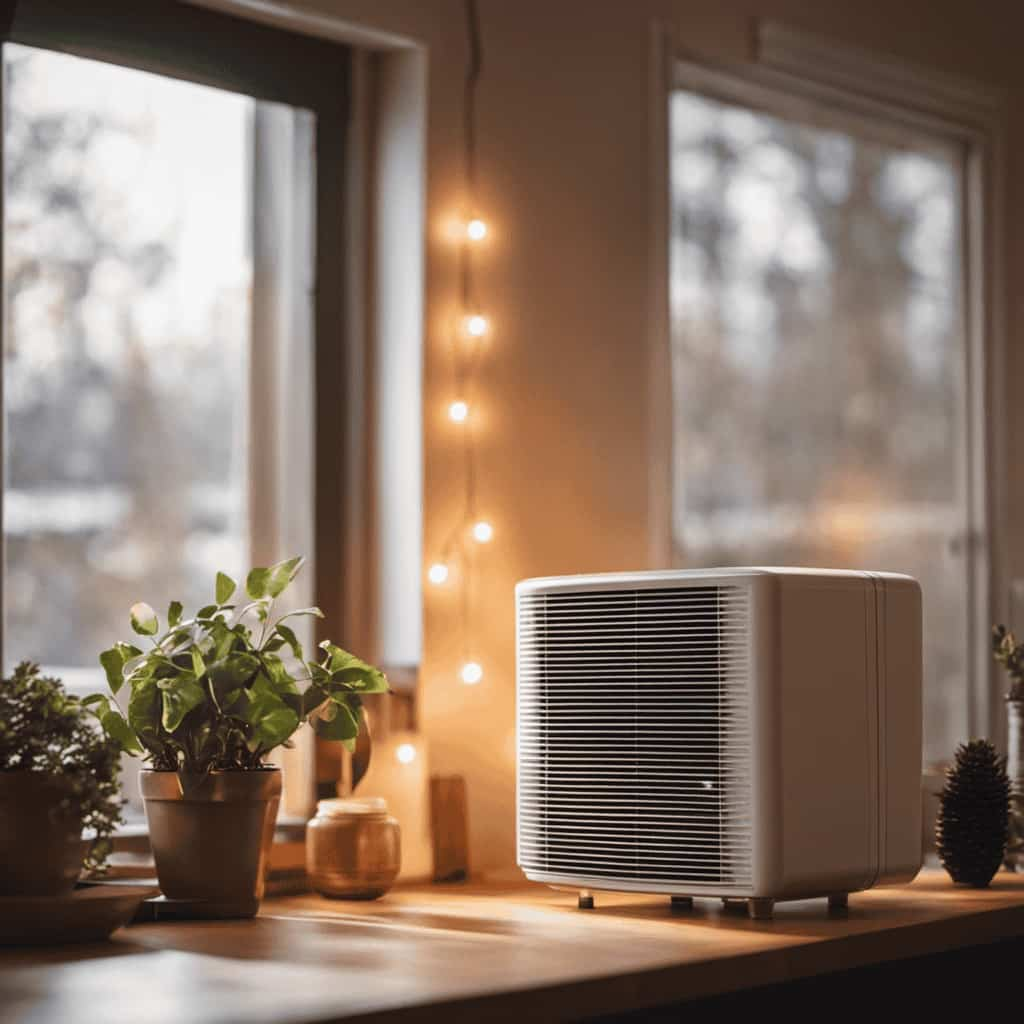
Key Takeaways
- Heat pumps are versatile and cost-effective, providing both heating and cooling capabilities.
- Heat pumps use natural heat sources and have lower carbon emissions compared to traditional heating methods, contributing to renewable energy.
- There are different types of heat pumps to consider, such as air source, ground source, and water source, with varying efficiency and cost factors.
- Energy efficiency ratings, such as SEER and HSPF, play a vital role in reducing energy consumption and utility bills, so it’s important to look for higher ratings for optimal energy efficiency.
The Basics of Eco-Friendly Heat Pumps
Let’s dive into the basics of eco-friendly heat pumps, which provide efficient and sustainable heating for homes. Understanding heat pump technology is key to appreciating the benefits of eco-friendly heating.
Heat pumps work by transferring heat from one area to another using refrigerant and a compressor. During the winter, they extract heat from the outdoor air or ground and transfer it inside, effectively warming the living space. In the summer, the process is reversed, with heat being removed from the indoor air and released outside. This dual function makes heat pumps versatile and cost-effective.
How Heat Pumps Contribute to Renewable Energy
Heat pumps contribute to renewable energy by utilizing natural heat sources, such as air, water, or the ground, to provide sustainable heating for homes. This innovative technology offers several benefits for both homeowners and the environment:
- Reduced reliance on fossil fuels: Heat pumps tap into renewable energy sources, reducing the need for traditional heating systems that rely on fossil fuels.
- Lower carbon emissions: By utilizing renewable energy, heat pumps have a significantly lower environmental impact compared to conventional heating methods.
- Energy efficiency: Heat pumps are highly efficient, converting a small amount of electricity into a larger amount of heat energy.
- Versatility: Heat pumps can provide both heating and cooling, making them a versatile solution for year-round comfort.
Understanding the different types of heat pumps will help you choose the most suitable option for your home’s heating needs.

Understanding the Different Types of Heat Pumps
When it comes to understanding the different types of heat pumps, two key points to consider are efficiency and cost.
Heat pump efficiency varies depending on the type, with ground source heat pumps typically being the most efficient.
However, air source heat pumps are generally more affordable upfront.
Efficiency of Heat Pumps
We can improve the efficiency of heat pumps by understanding the various types and their unique features. Here are some key factors to consider:

-
Heat pump technology: Different heat pumps use different technologies, such as air source, ground source, or water source. Understanding how each technology works can help you choose the most efficient option for your needs.
-
Energy savings: Heat pumps are known for their energy-saving capabilities. However, the level of energy savings can vary depending on factors like the size and insulation of your home, as well as the climate in your area. By understanding these factors, you can optimize the energy efficiency of your heat pump.
-
Seasonal performance factor (SPF): The SPF measures the efficiency of a heat pump over an entire heating season. Look for heat pumps with a higher SPF to ensure maximum efficiency.
-
Variable-speed technology: Heat pumps with variable-speed compressors can adjust their output based on the heating or cooling demand. This technology improves efficiency by reducing energy consumption during periods of lower demand.

Cost Comparison Between Types
To accurately compare the costs between different types of heat pumps, it’s important to consider factors such as installation, maintenance, and energy efficiency.
When conducting a cost analysis, it’s crucial to assess the initial investment required for purchasing and installing each type of heat pump. While some may have a higher upfront cost, they may offer greater energy efficiency and lower maintenance expenses in the long run.
Additionally, it’s essential to calculate the payback period for each heat pump type, which is the time it takes for the energy savings to cover the initial investment.
Factors to Consider When Choosing an Eco-Friendly Heat Pump
When choosing an eco-friendly heat pump, there are several factors to consider.

First, it’s important to look at the energy efficiency ratings of the heat pump. This will give you an idea of how effectively it can convert energy into heat.
Second, you should consider the different types of heat pumps available, such as air source, ground source, or water source heat pumps. Each type has its own advantages and disadvantages, so it’s important to choose one that suits your specific needs.
Lastly, you should also think about the installation and maintenance requirements of the heat pump, as this can affect its performance and longevity.
Energy Efficiency Ratings
Typically, homeowners should prioritize energy efficiency ratings when selecting an eco-friendly heat pump. Energy efficiency standards play a vital role in ensuring that a heat pump operates at its maximum efficiency, resulting in lower energy consumption and reduced utility bills.

Here are four key factors to consider when evaluating the energy efficiency of a heat pump:
-
Seasonal Energy Efficiency Ratio (SEER): This rating measures the cooling efficiency of a heat pump. Higher SEER ratings indicate better energy efficiency.
-
Heating Seasonal Performance Factor (HSPF): HSPF measures the heating efficiency of a heat pump. Look for a higher HSPF rating to ensure optimal energy efficiency during colder months.
-
Energy Star Certification: Choosing an Energy Star-certified heat pump guarantees that it meets or exceeds strict energy efficiency guidelines set by the Environmental Protection Agency (EPA).

-
Variable Speed Technology: Heat pumps with variable speed compressors adjust their performance based on the heating or cooling needs, resulting in greater energy efficiency.
Considering these factors will help homeowners make an informed decision when selecting an eco-friendly heat pump.
Now, let’s explore the different types of heat pumps available in the market.
Types of Heat Pumps
Let’s explore the different types of heat pumps available in the market and consider important factors when choosing an eco-friendly heat pump.

When it comes to heat pumps, there are three main types to consider: air source, ground source, and water source. Air source heat pumps are the most common and cost-effective option, while ground source heat pumps offer higher efficiency but require more extensive installation requirements. Water source heat pumps, on the other hand, utilize nearby water bodies for heat transfer, making them a great option for properties near lakes or rivers.
Efficiency comparison is a crucial factor to consider when choosing a heat pump, as it directly impacts energy consumption and cost savings. Additionally, installation requirements such as available space, ductwork, and electrical capacity should be carefully evaluated to ensure a suitable fit for your property.
Now that we’ve covered the different types of heat pumps and factors to consider, let’s move on to discussing installation and maintenance.
Installation and Maintenance
We prefer to thoroughly assess the installation and maintenance requirements before selecting an eco-friendly heat pump. Proper installation techniques are crucial to ensure optimal performance and energy efficiency.

Here are some important factors to consider when installing and maintaining an eco-friendly heat pump:
-
Sizing: It’s essential to choose the right size heat pump for your specific heating and cooling needs. Oversized or undersized units can lead to reduced efficiency and increased energy consumption.
-
Location: The location of the heat pump is crucial for efficient operation. It should be placed in a well-ventilated area, away from obstructions, and protected from extreme weather conditions.
-
Regular maintenance: Regular maintenance is vital to keep the heat pump operating at peak performance. This includes cleaning or replacing filters, checking refrigerant levels, and inspecting electrical connections.

-
Troubleshooting tips: Familiarize yourself with common troubleshooting tips, such as checking for air leaks, ensuring proper thermostat settings, and clearing debris from outdoor units.
By considering these installation and maintenance factors, you can ensure the longevity and energy efficiency of your eco-friendly heat pump.
Now, let’s explore the energy efficiency benefits of heat pumps.
The Energy Efficiency Benefits of Heat Pumps
Heat pumps offer significant energy efficiency benefits, making them an ideal choice for environmentally conscious homeowners. Not only do they provide efficient heating and cooling, but they also help reduce energy consumption and lower utility bills. By harnessing the natural heat from the air or ground, heat pumps can achieve energy savings of up to 50% compared to traditional heating systems. This has a positive environmental impact by reducing greenhouse gas emissions and reliance on fossil fuels.

To better understand the energy efficiency benefits of heat pumps, let’s take a look at the following table:
| Energy Efficiency Benefits | Description | Impact |
|---|---|---|
| Lower energy consumption | Heat pumps use significantly less energy compared to other heating systems, resulting in reduced energy bills and overall energy savings. | Cost-effective and reduced environmental impact |
| Renewable energy source | Heat pumps rely on natural heat sources such as air or ground, making them a sustainable and renewable heating option. | Reduced carbon footprint and increased sustainability |
| Versatile applications | Heat pumps can provide both heating and cooling, eliminating the need for separate systems. This versatility optimizes energy usage and efficiency. | Enhanced comfort and energy savings |
With their energy efficiency benefits, heat pumps are not only a smart choice for homeowners but also contribute to a greener and more sustainable future.
Proper Installation and Maintenance of Heat Pumps
When it comes to heat pumps, proper installation and maintenance are crucial for ensuring energy-efficient operation and prolonging the equipment’s lifespan.
By following manufacturer guidelines and hiring certified professionals, we can ensure that the heat pump is installed correctly and functions at its optimal efficiency.

Additionally, regular maintenance, such as cleaning filters and inspecting components, helps identify any potential issues early on, reducing the risk of costly repairs and maximizing the heat pump’s performance.
Ensuring Energy-Efficient Operation
To ensure the energy-efficient operation of your heat pump, it’s crucial to properly install and regularly maintain it. Here are some key tips to follow:
-
Choose the right size: Ensure that your heat pump is properly sized for your specific heating and cooling needs. An oversized or undersized unit can lead to inefficiencies and increased energy consumption.
-
Keep the air filters clean: Regularly clean or replace the air filters in your heat pump. Clogged filters can restrict airflow and reduce efficiency.

-
Maintain outdoor unit: Keep the outdoor unit clear of debris, such as leaves and grass clippings, to ensure proper airflow. This allows the heat pump to operate more efficiently.
-
Schedule professional maintenance: Arrange for annual maintenance check-ups by a qualified technician. They can inspect, clean, and tune-up your heat pump to keep it running at peak performance.
Prolonging Equipment Lifespan
To ensure a longer lifespan for our heat pumps, it is essential to properly install and regularly maintain them. By following proper installation practices and conducting routine maintenance, we can prolong equipment efficiency and increase equipment longevity. Proper installation involves ensuring correct sizing, proper placement, and appropriate insulation. Regular maintenance includes cleaning or replacing filters, checking and lubricating motors, inspecting electrical connections, and scheduling professional tune-ups. Additionally, it is important to regularly monitor and optimize the heat pump’s performance through energy management systems or smart thermostats. By taking these steps, we can maximize the lifespan of our heat pumps, reduce energy consumption, and minimize the need for costly repairs or replacements.
| Installation Practices | Routine Maintenance | Performance Optimization |
|---|---|---|
| 1. Correct sizing | 1. Cleaning/replacing filters | 1. Monitoring energy usage |
| 2. Proper placement | 2. Checking/lubricating motors | 2. Utilizing energy management systems |
| 3. Appropriate insulation | 3. Inspecting electrical connections | 3. Using smart thermostats |
Maximizing the Performance of Your Heat Pump
We can maximize the performance of our heat pump by following these simple tips:

-
Regular maintenance: Schedule annual maintenance checks by a professional to ensure optimal efficiency and troubleshoot any potential issues.
-
Clean and clear surroundings: Keep the area around the heat pump free from debris, leaves, and other obstructions that can hinder its performance.
-
Regularly clean filters: Dirty filters can reduce airflow, decreasing efficiency. Clean or replace filters as recommended by the manufacturer.
-
Optimize thermostat settings: Set your thermostat to a comfortable temperature, avoiding extreme highs or lows, to avoid overworking the heat pump.

By implementing these tips, we can improve the efficiency of our heat pump and troubleshoot any potential problems, ensuring that it operates at its best performance.
Take these steps to maximize the lifespan and effectiveness of your heat pump while reducing energy consumption.
Cost-Saving Tips for Using Heat Pumps
Two of the most effective ways to save costs when using heat pumps are by properly insulating your home and utilizing a programmable thermostat.
By insulating your home, you can prevent heat loss and maximize the efficiency of your heat pump. This can be achieved by sealing gaps and cracks, adding insulation to walls and attics, and ensuring that windows and doors are properly weather-stripped.

Additionally, using a programmable thermostat allows you to set different temperatures for different times of the day, ensuring that you’re only using energy when needed. This can lead to significant energy savings over time.
By implementing these energy-saving techniques, you can’t only reduce your heating costs but also contribute to a more sustainable future.
Now, let’s dive into comparing heat pumps to traditional heating systems.
Comparing Heat Pumps to Traditional Heating Systems
Let’s compare heat pumps to traditional heating systems and see how they differ in terms of efficiency and environmental impact.

-
Heat pumps are more energy efficient than traditional heating systems. They work by transferring heat from the outside air or ground to warm the inside of a building, instead of generating heat from fossil fuels like gas or oil. This results in lower energy consumption and reduced carbon emissions.
-
Traditional heating systems, on the other hand, rely on the combustion of fossil fuels to produce heat. This process is less efficient and contributes to air pollution and greenhouse gas emissions.
-
Heat pumps can also provide cooling in the summer, making them a versatile option for year-round comfort.
-
Traditional heating systems often require separate air conditioning units for cooling, increasing energy consumption and costs.

Eco-Friendly Heat Pumps and Indoor Air Quality
Using eco-friendly heat pumps can improve indoor air quality and reduce environmental impact. Heat pumps operate by transferring heat from one source to another, providing both heating and cooling capabilities. Unlike traditional heating systems that rely on combustion, heat pumps use electricity to move heat, resulting in cleaner and healthier indoor air. By eliminating the need for fossil fuels, eco-friendly heat pumps help reduce air pollution and greenhouse gas emissions. In addition to the environmental benefits, these heat pumps also offer health benefits. They filter and circulate the air, removing dust, allergens, and other pollutants, resulting in cleaner and fresher air. This can lead to improved respiratory health, reduced allergies, and a more comfortable living environment. See the table below for a summary of the health benefits of eco-friendly heat pumps.
| Health Benefits of Eco-Friendly Heat Pumps |
|---|
| Improved indoor air quality |
| Reduced allergies and respiratory issues |
| Cleaner and fresher air |
Incorporating eco-friendly heat pumps into your home not only helps to protect the environment but also provides a healthier and more comfortable living space. By improving indoor air quality and reducing the presence of pollutants, these heat pumps promote a more sustainable and innovative way of heating and cooling.
Exploring Incentives and Rebates for Eco-Friendly Heat Pumps
We have found three incentives and rebates available for eco-friendly heat pumps that can help homeowners save money on their installation and operation costs. Here are some options to explore:
-
Federal Tax Credits: The federal government offers tax credits for installing energy-efficient heat pumps. Homeowners can receive up to 30% of the cost of the equipment and installation as a tax credit.
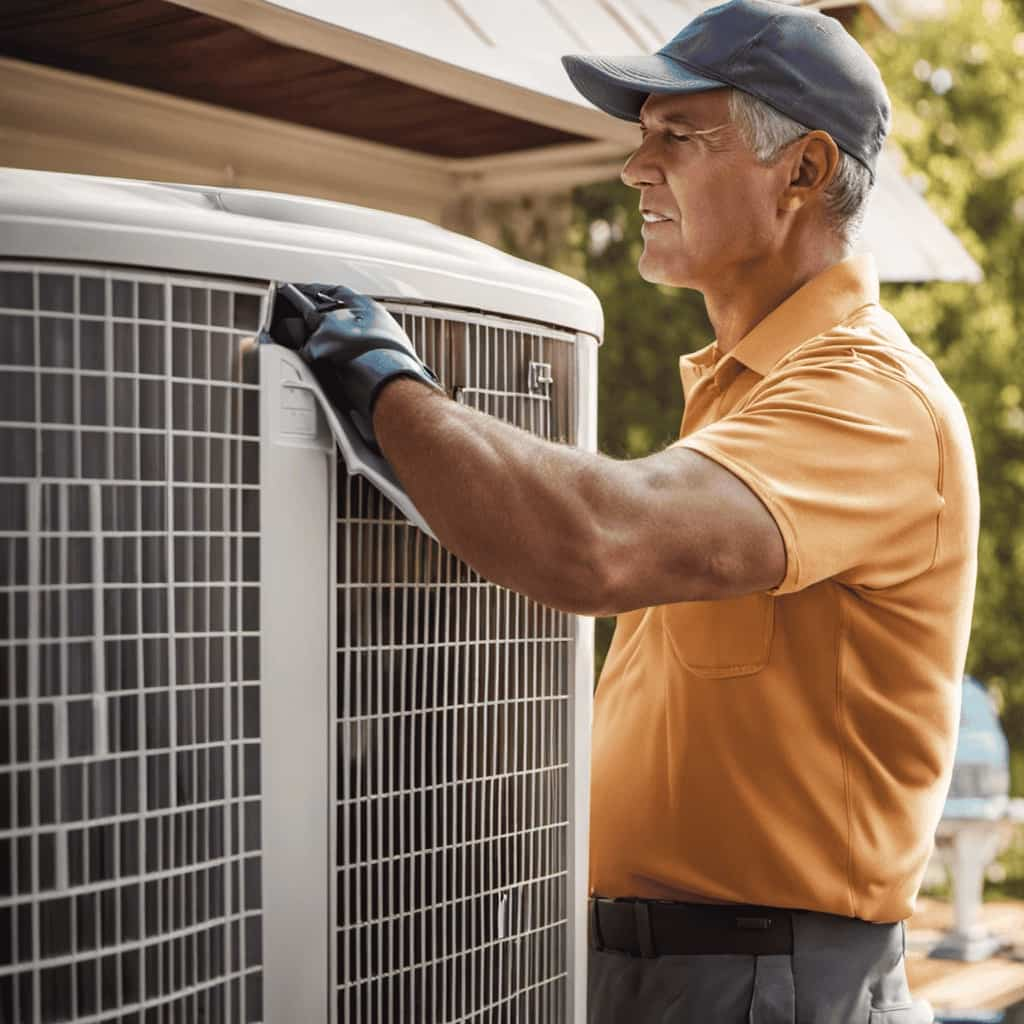
-
State and Local Rebates: Many states and local authorities offer rebates for eco-friendly heat pump installations. These rebates can vary in amount and eligibility criteria, so it’s important to research what’s available in your area.
-
Utility Company Incentives: Some utility companies provide incentives for installing energy-efficient heat pumps. These incentives could include cash rebates or reduced electricity rates for heat pump users.
-
Financing Options: In addition to incentives and rebates, exploring financing options can help make the upfront cost of eco-friendly heat pumps more affordable. Many financial institutions offer loans and financing plans specifically for energy-efficient home improvements.
By researching these incentives, rebates, and financing options, homeowners can find cost-effective ways to install and operate eco-friendly heat pumps.

Case studies of successful installations can provide real-world examples of the benefits and savings associated with these systems.
Frequently Asked Questions
Are Heat Pumps Suitable for All Types of Climate?
Heat pumps can be suitable for all types of climates. In extreme climates, heat pumps may require supplemental heating. However, in mild climates, the benefits of heat pumps, such as energy efficiency and reduced carbon emissions, can be maximized.
Can Heat Pumps Be Used for Both Heating and Cooling Purposes?
Yes, heat pumps can be used for both heating and cooling purposes. They are efficient and can save energy. With a heat pump, you can enjoy comfortable temperatures all year round while reducing your carbon footprint.
How Long Does a Heat Pump Typically Last?
Heat pumps typically last around 15-20 years with proper maintenance. Signs of heat pump failure include reduced heating or cooling efficiency, strange noises, and frequent breakdowns. Regular maintenance can help prolong the lifespan of a heat pump.

How Noisy Are Heat Pumps During Operation?
During operation, heat pumps can produce varying noise levels. However, there are soundproofing options available to minimize any potential disturbances. Our guide provides innovative solutions to ensure a peaceful and eco-friendly heating experience.
Are There Any Government Regulations or Certifications for Eco-Friendly Heat Pumps?
There are government regulations and certifications for eco-friendly heat pumps. One of the most recognized certifications is the Energy Star certification, which ensures that the heat pump meets certain energy efficiency standards set by the government.
Conclusion
In conclusion, eco-friendly heat pumps are a practical and efficient solution for heating your home while reducing your carbon footprint.
Like a gentle breeze on a warm summer day, these heat pumps harness renewable energy sources to provide reliable and sustainable heating.

By understanding the different types of heat pumps and considering factors such as energy efficiency and cost savings, you can make an informed choice that benefits both the environment and your wallet.
So, why not make the switch to eco-friendly heat pumps and enjoy a greener way of heating your home?
Renewable Energy Sources
Harnessing the Sun: Revolutionizing Heat Pumps

Imagine a future where solar power is used to power heat pumps, providing homes and businesses with efficient and sustainable heating and cooling solutions.
In this article, we explore the revolutionary technology of solar-powered heat pumps and how they are transforming the way we harness energy. By integrating solar energy into heat pump systems, we are not only increasing their efficiency but also reducing our carbon footprint.
Join us as we delve into the exciting world of solar-powered heating and cooling and the endless possibilities it holds for a greener future.
Key Takeaways
- Solar-powered heat pumps increase efficiency and reduce carbon footprint.
- Solar heat pumps provide a greener alternative to fossil fuel-based systems, combat climate change, and improve air quality.
- Government incentives and tax credits make installation more affordable and encourage widespread adoption.
- Technological advancements in solar heat pumps include improved efficiency, integration with smart home systems, enhanced durability, and the development of hybrid systems combining solar with other renewable energy sources.
The Solar Energy Advantage
We’re excited to explore the solar energy advantage in revolutionizing heat pumps.
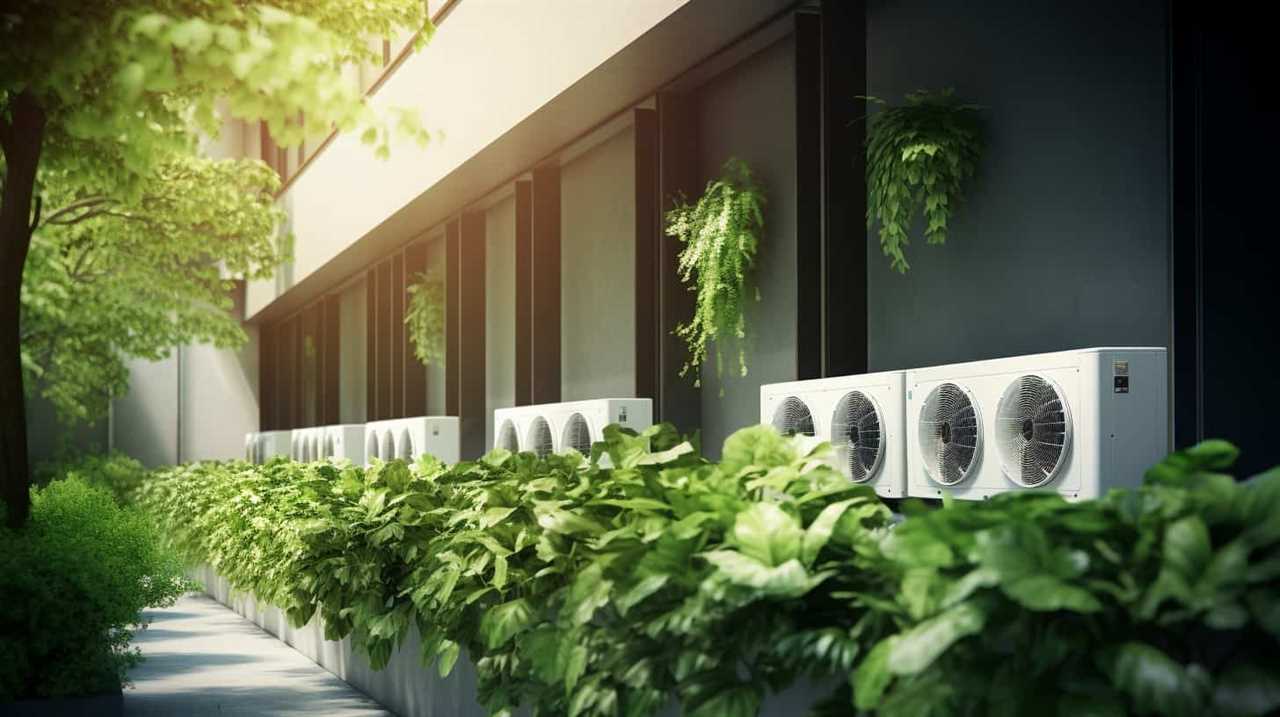
Solar energy storage plays a crucial role in this innovation. By harnessing the power of the sun, heat pumps can operate more efficiently and sustainably. Solar heat pump installations utilize photovoltaic panels to convert sunlight into electricity, which can then be used to power the heat pump system. This renewable energy source reduces dependency on fossil fuels and lowers carbon emissions.
Additionally, solar energy storage allows for excess energy generated during the day to be stored and used when sunlight isn’t available, ensuring a continuous supply of energy. This technological advancement not only benefits the environment but also provides cost savings for homeowners and businesses.
The solar energy advantage in revolutionizing heat pumps opens up new possibilities for sustainable heating and cooling solutions.
Solar-Powered Heat Pump Technology
Solar-powered heat pump technology combines the efficiency of heat pumps with the renewable energy of solar power. This innovative approach to heating systems offers numerous benefits, making it an attractive option for many homeowners.

Here are three key points to consider:
-
Increased energy efficiency: By harnessing the power of the sun, solar-powered heat pumps can achieve higher levels of efficiency compared to traditional heating systems. This translates to lower energy consumption and reduced utility bills.
-
Cost-effective installation: While the initial cost of installing a solar-powered heat pump may be higher than traditional systems, the long-term savings on energy bills can offset this expense. Additionally, government incentives and tax credits are often available to help make the installation more affordable.
-
Environmental sustainability: By relying on renewable solar energy, these heat pumps significantly reduce carbon emissions and help combat climate change. They provide a greener alternative to fossil fuel-based heating systems.
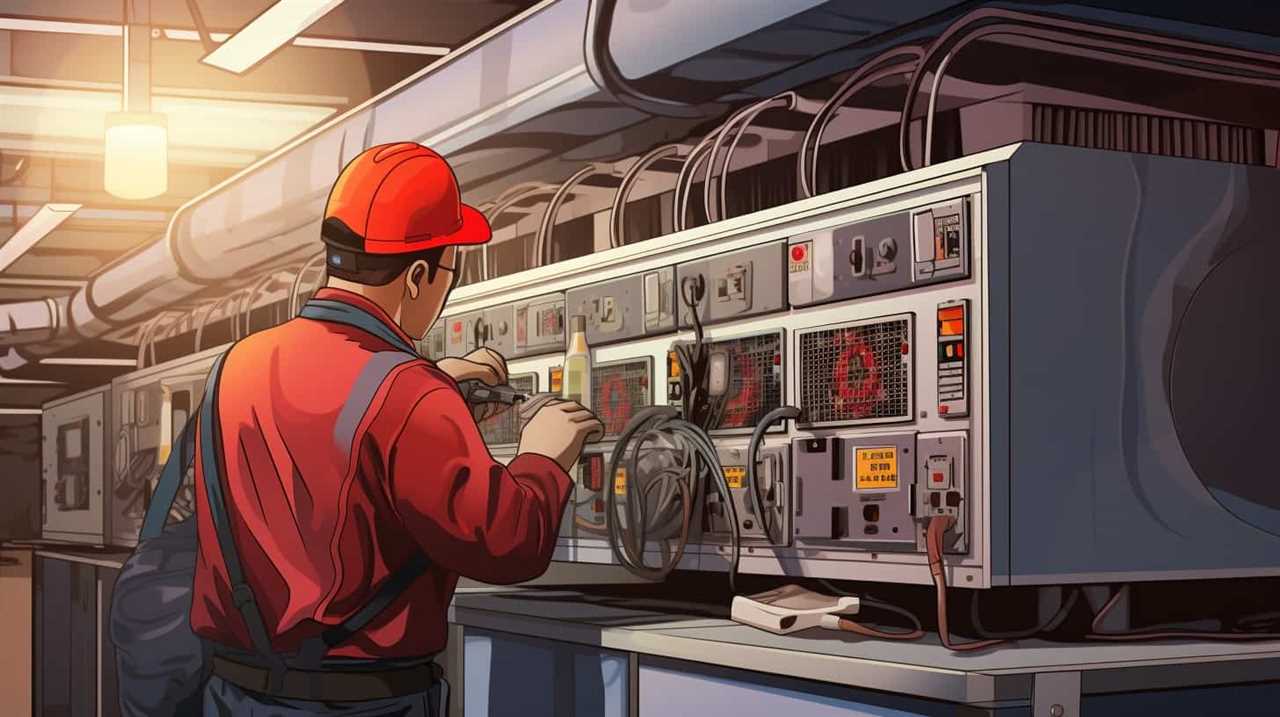
Investing in solar-powered heat pump technology not only offers cost savings but also contributes to a more sustainable future.
Increasing Efficiency With Solar Integration
By integrating solar technology, we can significantly enhance the efficiency of heat pumps. Solar thermal energy, a form of renewable energy, can be used to supplement the power required by heat pumps, reducing their energy consumption and increasing their overall efficiency. This integration allows heat pumps to harness the power of the sun to generate heat, reducing the reliance on traditional energy sources and decreasing greenhouse gas emissions. The table below summarizes the advantages of solar integration in heat pump systems:
| Advantages of Solar Integration |
|---|
| Reduced energy consumption |
| Increased overall efficiency |
| Lower greenhouse gas emissions |
Environmental Benefits of Solar Heat Pumps
Solar heat pumps offer significant environmental benefits, reducing carbon emissions and reliance on fossil fuels for heating and cooling systems. Here are three key reasons why solar heat pumps are a game-changer:
-
Reduced carbon footprint: By harnessing the power of the sun, solar heat pumps eliminate the need for traditional fossil fuel-based heating and cooling systems. This leads to a significant reduction in carbon emissions, helping combat climate change and improving air quality.
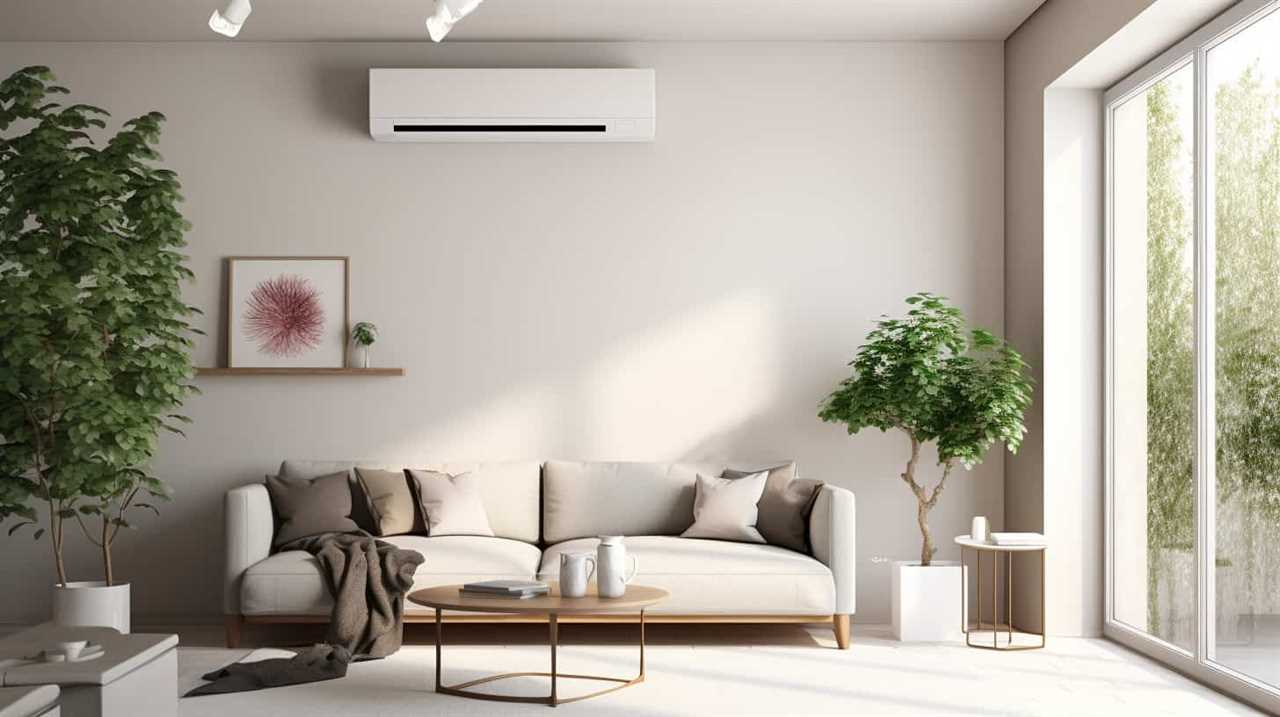
-
Energy efficiency: Solar heat pumps operate at a high level of energy efficiency, converting solar energy into usable heat or cool air. This not only reduces energy consumption but also lowers utility bills for homeowners and businesses.
-
Cost-effectiveness: While the initial installation cost of solar heat pumps may be higher compared to traditional systems, the long-term savings on energy bills make it a cost-effective investment. Additionally, with advancements in technology and increased demand, the cost of solar heat pump installation is gradually decreasing, making it more accessible to a wider audience.
The Future of Solar-Powered Heating and Cooling
As technology advances and renewable energy becomes more prevalent, the future of heating and cooling systems is poised for a solar-powered revolution. Solar powered HVAC systems are emerging as a viable alternative to traditional heating and cooling methods. These systems utilize solar energy to generate heat or cold, reducing dependence on fossil fuels and lowering greenhouse gas emissions.
The key to widespread adoption lies in the role of government incentives in promoting solar heat pumps. Governments can provide financial incentives, such as tax credits or subsidies, to encourage homeowners and businesses to invest in solar-powered heating and cooling systems. These incentives can offset the initial cost of installation and make solar heat pumps more affordable and accessible.

Frequently Asked Questions
How Much Does It Cost to Install a Solar-Powered Heat Pump System?
Installing a solar-powered heat pump system can be cost-effective in the long run, despite the initial upfront costs. By harnessing the sun’s energy, it reduces electricity bills and provides significant environmental benefits, making it a smart investment for those seeking innovation.
Can a Solar-Powered Heat Pump Reduce My Energy Bills?
A solar-powered heat pump can significantly reduce energy bills due to its ability to use the sun’s energy for heating and cooling. However, it’s important to consider the initial cost and potential limitations of this technology.
How Does Solar Integration in Heat Pumps Affect the Lifespan of the System?
Solar integration in heat pumps can significantly extend the lifespan of the system. By harnessing the sun’s energy, the system operates more efficiently, reducing wear and tear. Additionally, it decreases the system’s carbon footprint, making it a sustainable and innovative solution.
Are There Any Government Incentives or Tax Credits Available for Installing Solar-Powered Heat Pumps?
Yes, there are government incentives and tax credits available for installing solar-powered heat pumps. These incentives can help offset the upfront costs and make the transition to renewable energy more affordable.
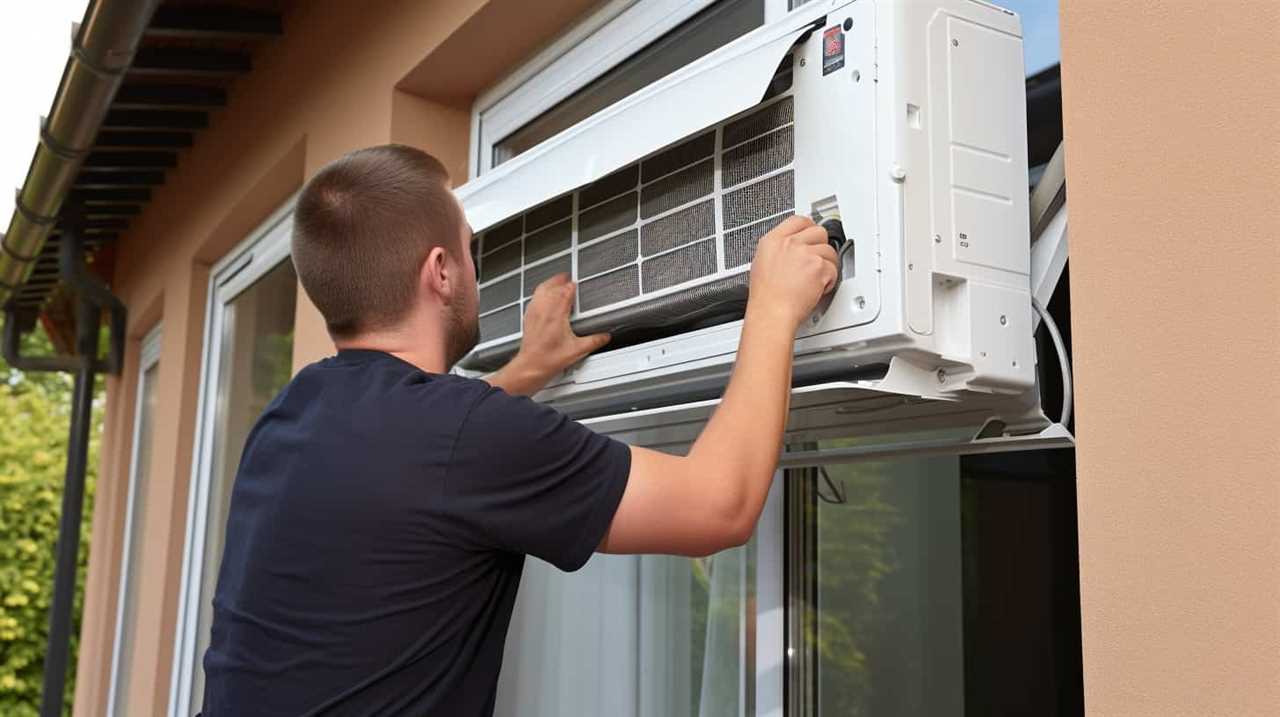
Can a Solar-Powered Heat Pump Be Used in Areas With Limited Sunlight?
A solar-powered heat pump can still be used in areas with limited sunlight. Although the efficiency may be reduced, the benefits of using a solar heat pump in off-grid areas include energy independence and reduced reliance on traditional energy sources.
Conclusion
In conclusion, solar-powered heat pumps are revolutionizing the way we heat and cool our homes. By harnessing the power of the sun, these innovative systems offer increased efficiency and environmental benefits.
With the integration of solar technology, heat pumps are becoming more cost-effective and sustainable, reducing our reliance on traditional energy sources.
As we look to the future, solar-powered heating and cooling will play a significant role in creating a more sustainable and energy-efficient world.
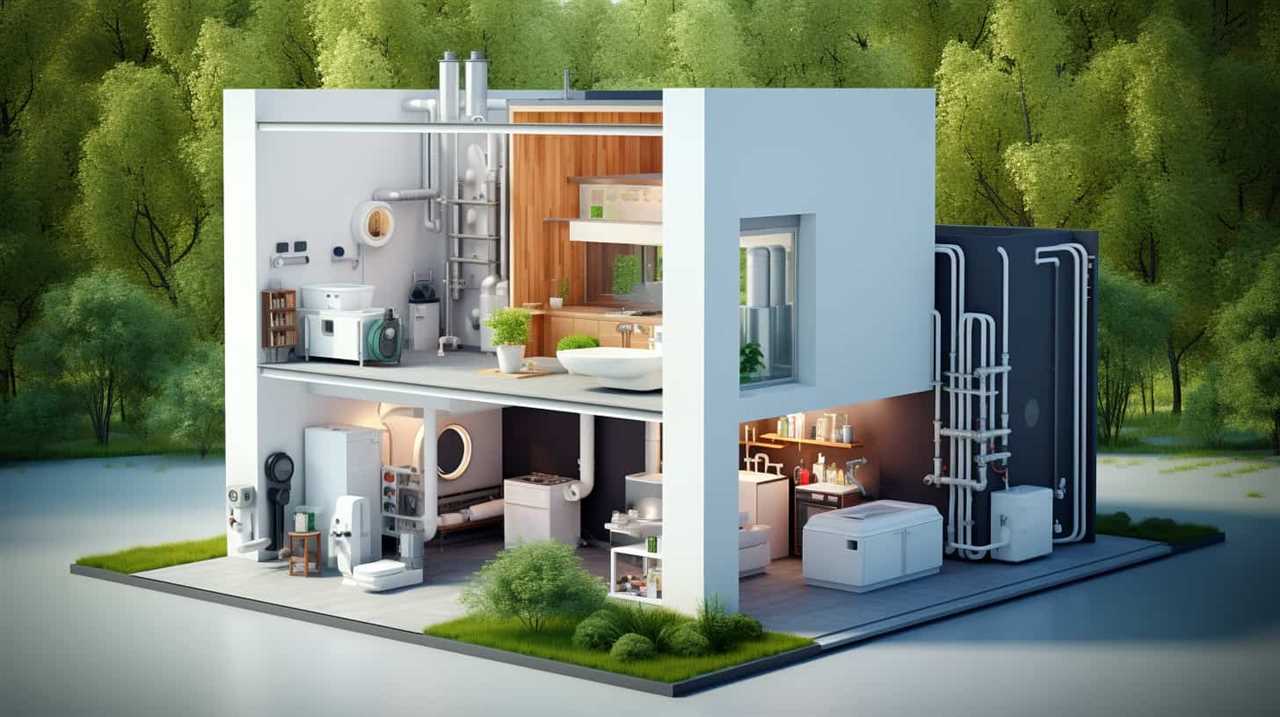
It’s time to embrace this anachronism and step into a brighter, greener future.
-

 Residential and Commercial Applications3 months ago
Residential and Commercial Applications3 months agoBest Amana Heat Pump Reviews
-

 Thermal Energy Transfer3 months ago
Thermal Energy Transfer3 months agoBreakthroughs in Modern Heat Pump Systems: Thermal Energy Edition
-

 Residential and Commercial Applications3 months ago
Residential and Commercial Applications3 months agoBest Heat Pump
-

 Geothermal Heat Pumps2 months ago
Geothermal Heat Pumps2 months agoUpgrade Your Comfort with Our Efficient HVAC Systems
-

 Geothermal Heat Pumps2 months ago
Geothermal Heat Pumps2 months agoInnovative Geothermal Heat Pump Manufacturers Revolutionize Energy Efficiency
-

 Air Conditioning4 weeks ago
Air Conditioning4 weeks agoExploring Energy-Efficient Air Conditioning Heat Pumps
-

 Thermal Energy Transfer3 months ago
Thermal Energy Transfer3 months agoBoost Your Heat Pump Efficiency: Interactive Guide
-

 Residential and Commercial Applications3 months ago
Residential and Commercial Applications3 months agoBest Portable Heat Pump Heat & AC











